Sport to Leadership





Series 1
Kara Hagen
Paula Burns
Keegan Brantner
Maria Fitzpatrick
Series 2
Shawn Daye-Finley
Chris Witkowski
DylanTait
Mike Mikado
Series 3
Tracy Wong
Alexa Koshman
Kristi Legge
Bonnie James Series 4
Kirsten Barwegen
Dana Holland
Click any name to go directly to their story
From Sport to Leadership Series 4 is a 3-part series of stories featuring local first responders in our community sharing their experience with sport, and how the skills learned through sport and active recreation impact their professional roles and life.
Thank you to all our contributors for sharing their stories.
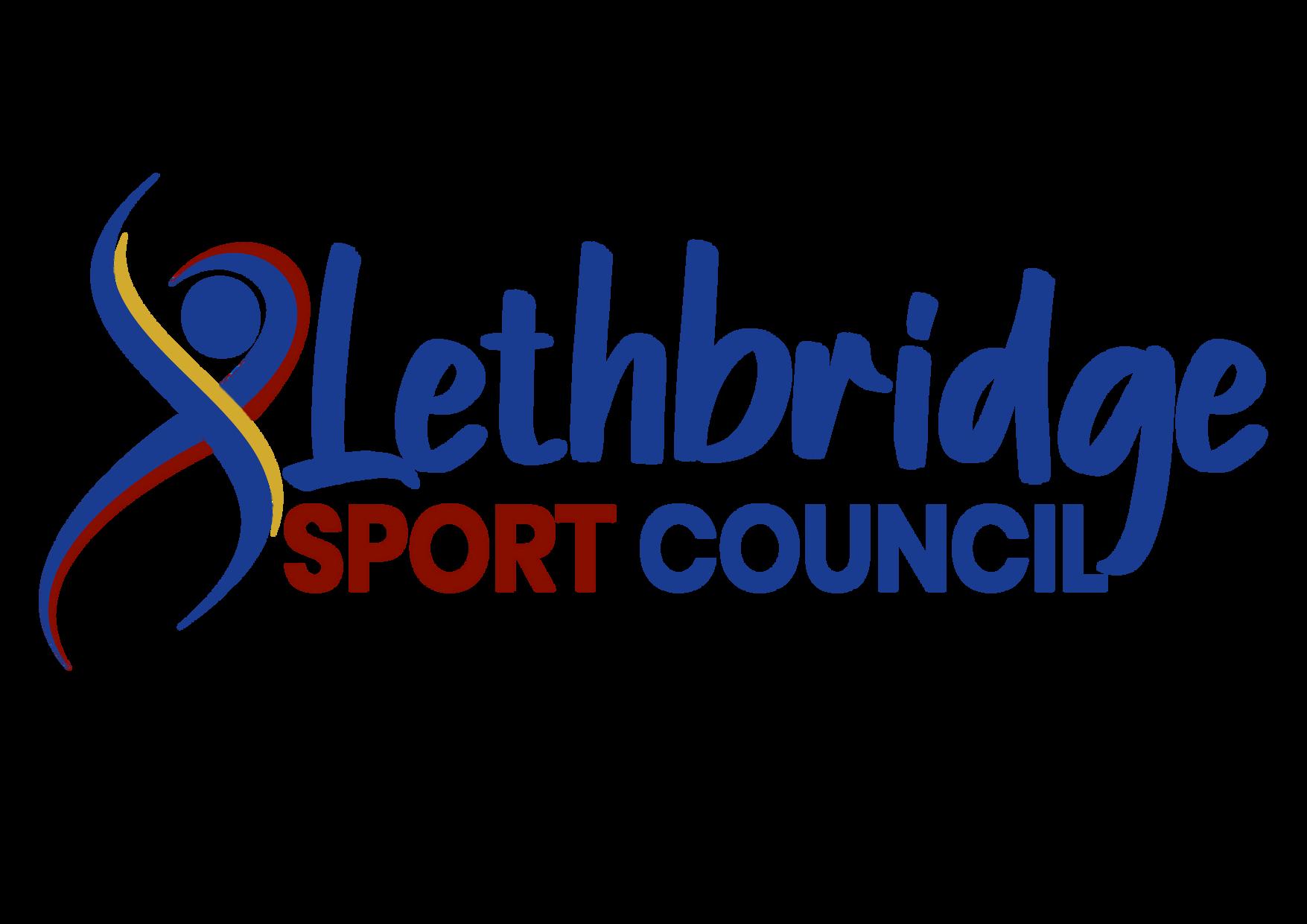
by Constable Kirsten Barwegen, Lethbridge Police Service
I have loved competition ever since I could walk, growing up with four siblings helped me foster an innate desire for competition. I started playing hockey in Kindergarten, and as the only girl in the small group that gathered on Friday nights, I felt I had something to prove. I am sure my parents needed to apologize to more than one of the other parents in the group after I had cross-checked their son into the boards because “He sucks at skating Dad and I wanted the puck”.
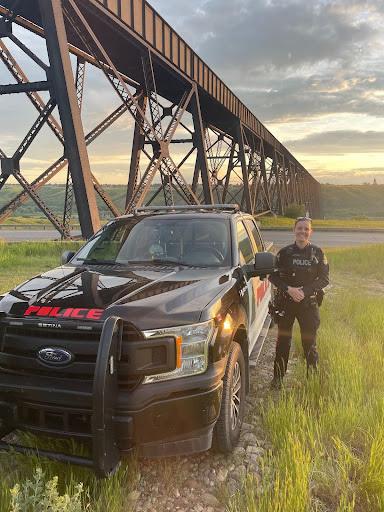
As I got into middle school and high school, I was given the opportunity to play community soccer and basketball Through these sports, I was able to compete and hone my skills This was also my early introduction to being part of a team. Basketball, soccer and hockey planted seeds in me, showing the value of working as part of a team towards a common goal.
I found purpose and belonging in being a member of a team. I loved making connections with teammates and working hard to get better. Sports were my escape from the typical teenage stresses and drama. On the field or court, my head would clear and I would just feel JOY. This was also my exposure to failure and not meeting goals I learned that sometimes the most growth happens when you fail When I fall short of my intended target, I am all the more motivated to practice and adapt my learning
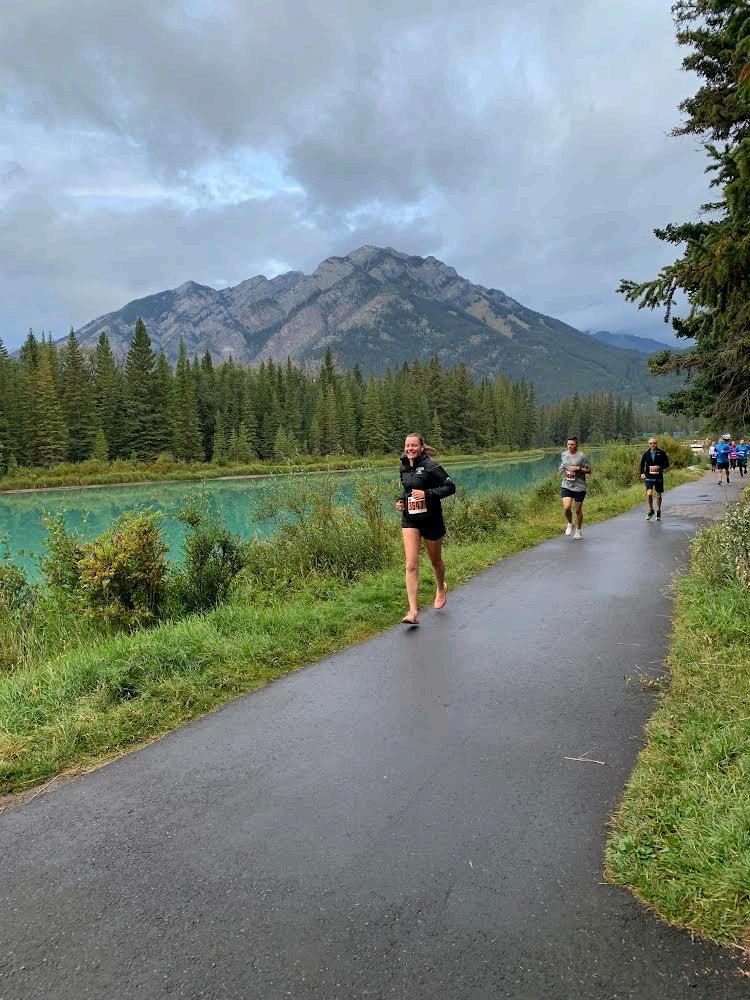
Now I have my dream job, I get to police in the community I was raised in. Although this is what I felt called to do since I was a young kid, it did not come easy. This career comes with heartbreak, patience, endurance, resilience, and sacrifice. All of these qualities were fostered in me through sport. Sport taught me that: Being a part of a team requires sacrifice. Success requires the members of the team to sacrifice their own wants for the greater good. Resilience is the capacity to recover quickly from difficulties (toughness). Patience with things out of my control. Patience with growth. Patience with different personalities and opinions. Allowing heartbreak & sacrifice by giving your all in the moment and then having the ability to walk away knowing you did your best, regardless of the outcome
Policing is a team career, and I am nothing without my team. They allow me to excel in my strengths and support me where I am weak. I have been knocked down, and I have felt discouraged and overwhelmed. However, my resilience carries me through these trials. My career, much like a sports season, is a marathon, not a sprint. There will be highs and lows. There is JOY in understanding that growth takes time and that I do not have control over all things. Much like on game day, when I put my uniform on I rely on all the qualities sport taught me to go serve my community.
Now that I am no longer playing organized sport. I still seek out opportunities to connect with sport. Whether it is playing pick-up basketball, coaching, or watching some local teams, I still try to stay connected to the community who helped me grow. I was able to be mentored and coached by multiple people who demonstrated the values I hold so dear now.
I have two former teammates who had to battle through devastating injuries. While they were navigating their rehab and what sport was going to look like for them moving forward they were still the ultimate teammates. I learned a lot from them as they handled the unexpected cards that were dealt to them with grace and patience.
I also had teammates and coaches who were able to push me to grow in my leadership They lead by example on how good leaders are the first to sacrifice and place those around them in an environment that will help them thrive
Now, in my work team, I look for how I can best benefit the team and how I can draw out the best from my co-workers. As my career progresses I hope to seek out growth opportunities and mentors who can come alongside me.
I would not be the person I am today without those opportunities. I try to give back to those communities by coaching at the high school and college where I was able to play Now I get to mentor kids in sport
I love to encourage my players that winning and competing is so much fun, but sport can do so much more for you Like creating lasting lifelong friendships, and providing you with life skills that will help in your future career or family life. It teaches you discipline, the value of hard work, social skills, working as a part of something bigger than yourself, resilience, and pride in what your body can do physically and mentally.
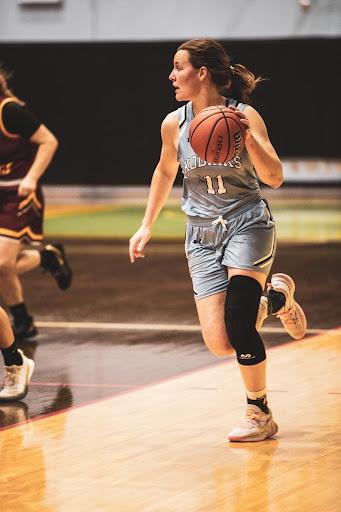
Sport changed my life in so many ways. I built lifelong relationships and grew the skill set I use at work every day. I see how sports impacted my life. That is why I am so passionate about youth getting the opportunity to play sport in whatever capacity they can.
Throughout my sports career, I had highs and lows. I honestly don’t remember the wins and losses nearly as much as I remember the memories I made with my teammates. I remember all the hard work, blood, sweat, and tears that lead to growth. But most of all I will remember the JOY I felt to be a part of something bigger than myself.
As I work through my career, I want to take opportunities to grow by looking for opportunities to push myself out of my comfort zone. I know that often the greatest rewards come when I step out of my comfort zone and be bold.
The best piece of advice I can give other athletes is to find your WHY. Have fun with it, at the end of the day, winning and competing is fun but what truly matters is loving what you do.
A series featuring local first responders sharing their experience with sport, and how the skills learned through sport and active recreation impact their professional roles and life.
by Bonnie James, Captain, Lethbridge Fire & Emergency Services
I began my life in sport as a competitive swimmer. My parents wanted my sister and I to be involved in sports, and back then there weren’t a lot of choices especially for girls. We had tried gymnastics but were told we were “too tall” so we were excited to find swimming. Swimming taught both independence and teamwork in sport. Independence because how hard you work directly affects how well you do, teamwork because other members are relying on you for relays and team aggregates
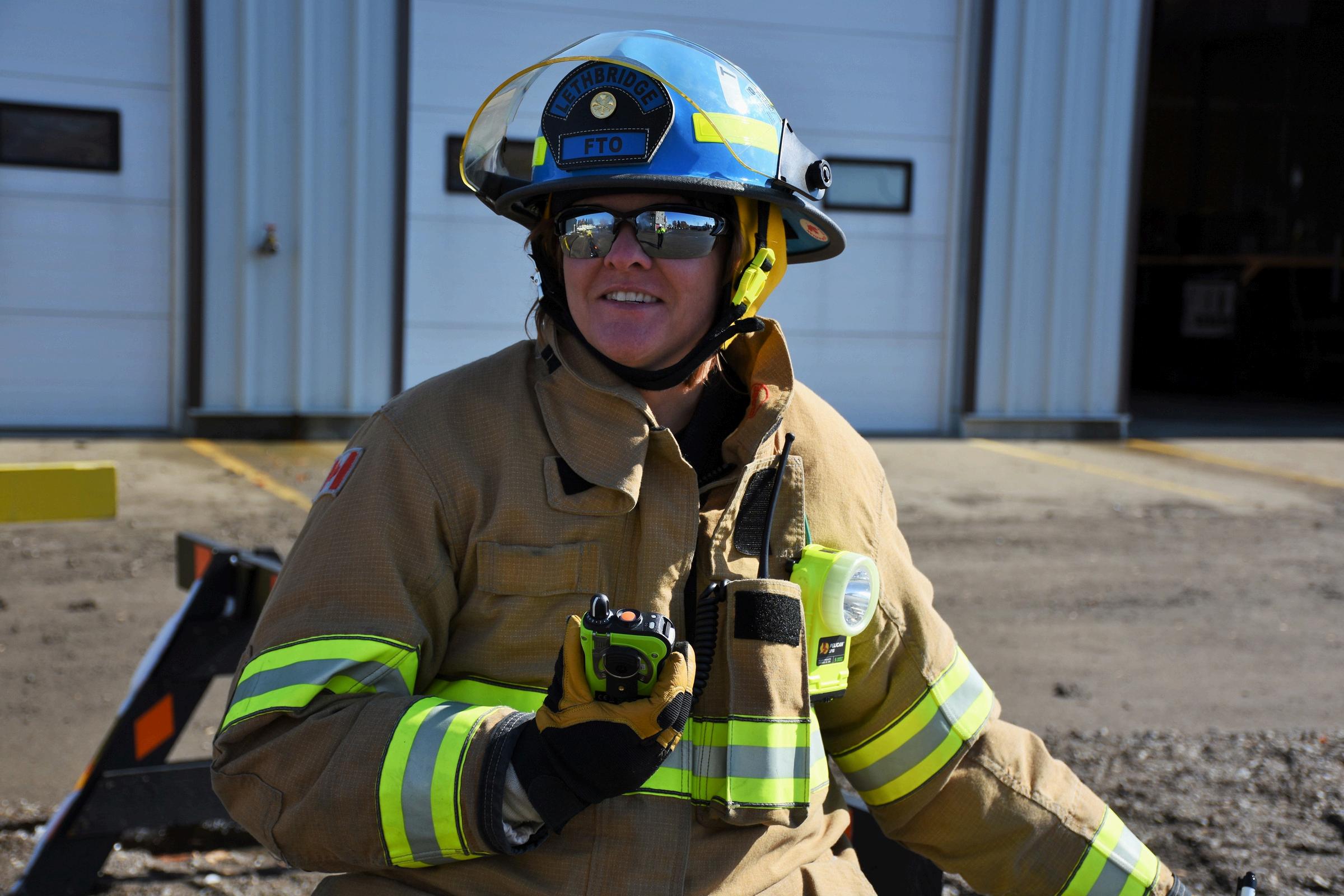
As a competitive swimmer we were “forced” from a young age (I started at 8 y/o) to be organized/ disciplined We swam 5 nights a week and as I got older Saturday mornings as well The season lasted for the entire school year so you had to be disciplined and organized to get your homework done before practice so that you could have some free time after This disciplined lifestyle helped us become honours students and high-ranking swimmers However good coaches taught us to work hard but make sure to have fun
In Junior High I branched out trying as many sports as possible: cross country running, volleyball, basketball, badminton, and multiple track events (which now my height was a blessing not a curse). These afforded me the opportunity to continue in both individual and team atmospheres. As I got older, I realized that a team is where I enjoyed being the most and by 16 I quit swimming to focus on school sports, especially basketball. This carried on into my first round of college where I played for the Red Deer College Queens Basketball Team.
Most sports come with their share of physical injuries but the most challenging moment for me was mentally. In grade 12 I was co-captain of the Churchill Griffins basketball team. One day after practice, I broke down at the coach, questioning why he always yelled at or made an example of me. I felt it wasn’t a fair representation of my play. His response caught me off guard. He agreed with me, but he said “I use you as an example because I know you are strong and can take it. I need to get my point across and if I direct the comments at others on the team, they will immediately fall apart” That was the moment I learned that life wasn’t always going to be fair but that through my years of participation in sports, especially individual ones, I had developed the skillset to help my team I also realized then I had the ability to help and influence others and the potential to become a leader
I sort of stumbled upon my career path I had been working for 5 years full time at the Hospital and had come to the realization that the career I had chosen was not going to sustain me in the long term, thanks to an amazing boss who mentored me well But I had no idea what I wanted to do In my spare time I had become a lifeguard as an adult, and the water was still calling me One of my instructors had just been hired by the Lethbridge Fire department and encouraged me to look at this career path So, I decided to give it a try, what did I have to lose?
With the support of my boss, I enrolled in EMT-A. and I loved the training. As we finished class and headed out on our practicums, I was ready to pack my bags and move to Calgary. The only reason being was that in Lethbridge, EMS and Fire are combined... and women weren’t firefighters. I had grown up watching Johnny and Roy on TV starring in “Emergency!” but that was a career for men not women. About a week into my practicum though I was hooked. I decided to give it a try and 30 years later here I still am.
Without sport I would not have had the physical or emotional strength to walk down this path My early sport gave me the mental strength and confidence in myself, and my team sports have given me the desire to become an integral, productive team member. I am definitely at my best as part of a team and there is no greater team than that of a fire crew. We comprise a second family for each other, we don’t just work together we literally live together. Training, preparing meals and eating together, spending our off-work time together as well (a lot due to our crazy schedules), and most importantly placing our lives in each other’s hands.
I don’t believe that it is a coincidence that the majority of firefighters have come from hockey backgrounds. But even if not hockey (some of us did not have that option), some sort of sport background It is knowing how to be a good team member that gets us through each day The ability to support, encourage and celebrate each other are all vital skills learned from sport The funny thing is though as such a strong team advocate, I have never really thought of myself as a leader My goal everyday has always been to improve someone’s life whether it be a citizen or a fellow employee, make things better than they were yesterday, and to share my experience and knowledge with those around me However, the treatment, comments and support I receive everyday make me realize that I am in fact a valued leader, not because of the stripes on my shoulder but because of the values of the person behind them.
Sport itself is actually a teacher and mentor helping us to become strong rounded individuals. It teaches us physical skills and strengths which contribute greatly to our health, but more important are the mental skills: coping, resilience, determination, confidence and self-worth just to name a few There is an old saying by Friedrich Nietzsche 1888, “what doesn’t kill you makes you stronger”, and although he was talking about war not sport, I believe it fits sport as well
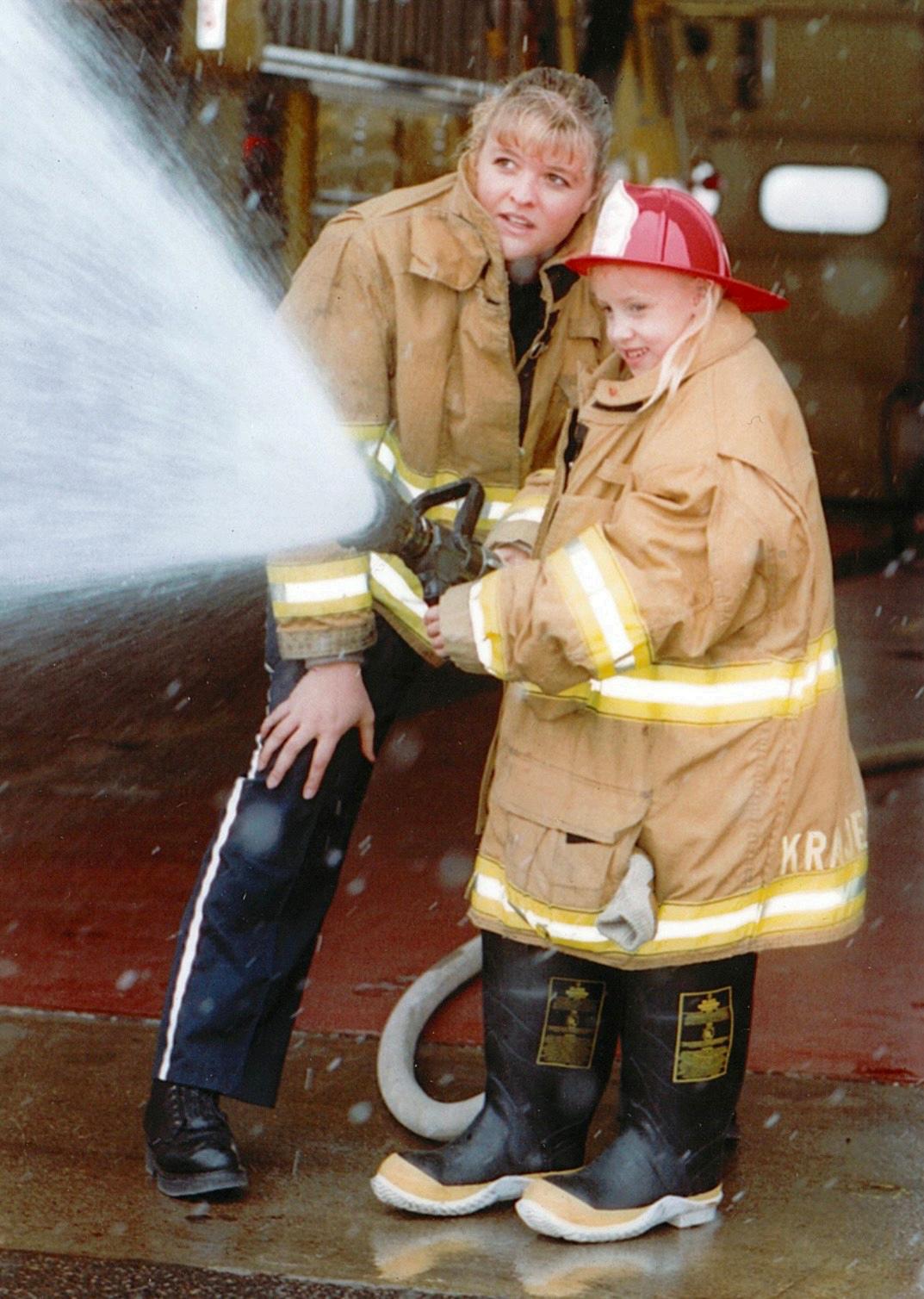
I now have a teenage son who is involved in sports and every time we arrive at a practice, game or tournament the last thing I have always said is, “Play hard, have fun” I don’t believe sport should be just about winning. Although the goal is to win, it is the experience and trying your best that makes a better person. I think that this is a very important item to remember. Sometimes we get so caught up in winning we forget to applaud our kids, or ourselves, when we have tried our best. Remember there are important skills learnt from losing as well, maybe even more important than the ones we learn from winning. I truly believe that sometimes doing your best, and not winning, helps us to grow more and become more resilient, confidant, better humans.... Although winning always feels better.
Although direct team sport participation has not followed me into my later adult life I have maintained involvement through many aspects of volunteering Whether a medical volunteer for various camps and events or positions with Lethbridge Sport council These positions have afforded me the ability to see future generations reaching their potential as their best selves
As I near the next stage of my life preparing for my planned escape to the mountains, I find myself looking forward to individual sport again in the great outdoors. I also consider myself extremely fortunate to have chosen the career I did. It is my current role as a Fire Captain that I have the honour of leading the next generation of firefighters. The respect and admiration shown to me in this position is priceless and I hope that I can have a positive effect on their lives and careers as my mentors and coaches have had on me.
A series featuring local first responders sharing their experience with sport, and how the skills learned through sport and active recreation impact their professional roles and life.
by Constable Dana Holland, Lethbridge Police Service
I was the kid who lived and breathed soccer. The work hard, play hard mentality was woven into my adolescence and my dedication to sport. I got to school early, then at lunch I raced home and back again just so I could fill my soccer quota on the Fleetwood Bawden fields Both my parents worked long hours but that never stopped my 11-year-old self from biking the 19 km round trip from Hardieville to Lakeview to play our game I made a commitment, so I pushed through my difficult circumstances to show up for my friends
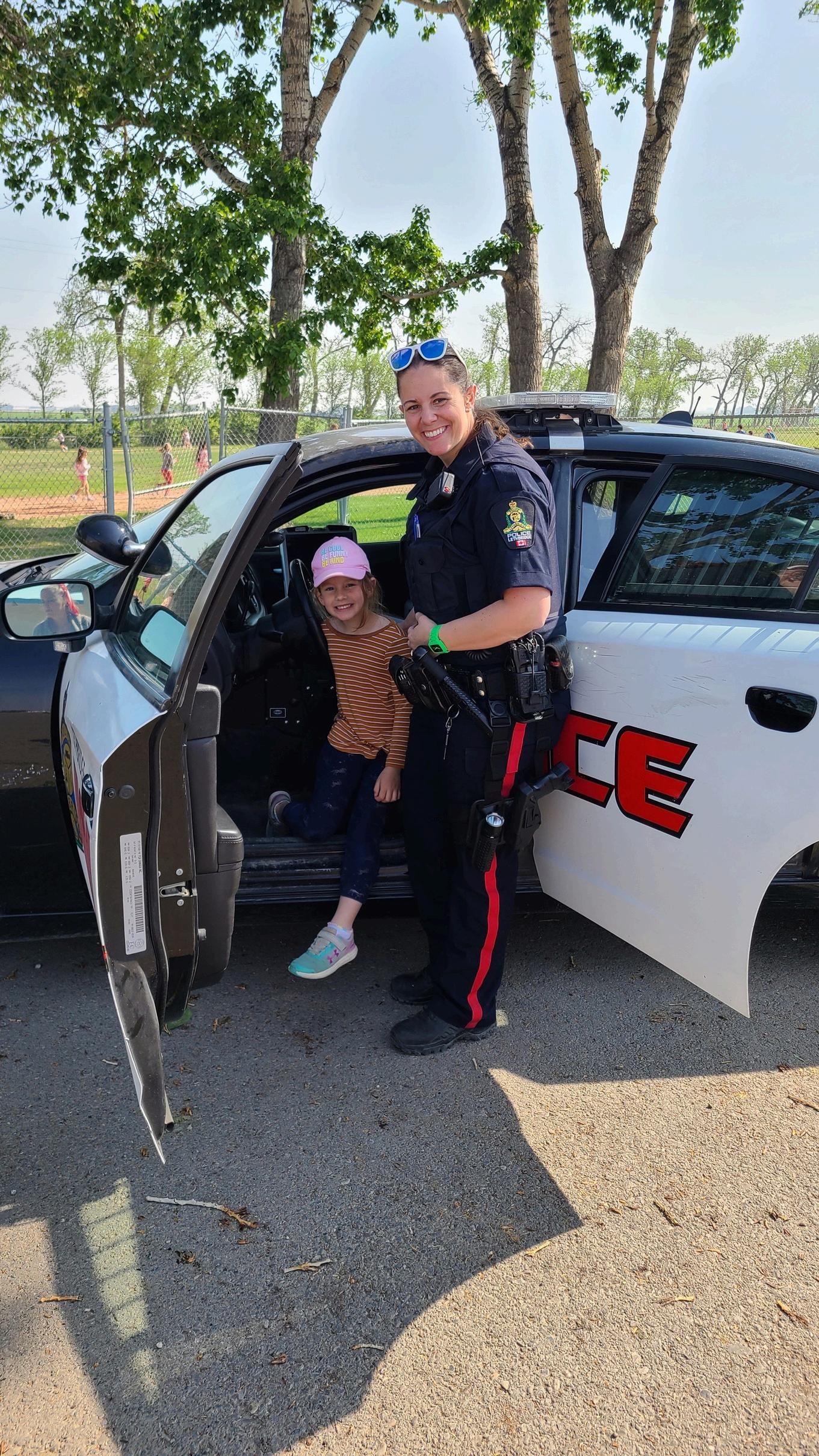
My devotion to sport continued into Junior High where I competed in both Cross Country and Track I then turned my sights to basketball in 8th grade with the attitude of “You never know until you try” I was a year behind my classmates so I knew I needed to excel in both athleticism and attitude to be noticed… and it paid off. I earned my spot with the Hamilton Hornets but was politely told my main role would be benchwarmer. Now to some, this revelation would be devastating, but I took this as an opportunity to change my outcome. I remained optimistic, had a positive attitude, practiced daily, and worked hard to become the 3rd highest scorer on the team. I took a situation that could have been bleak, set some goals, and created the outcome I desired. This attitude of setting my sights high has continued into adulthood as I transitioned from team to individual sports like hiking and biking. However, I quickly realized the chosen sport doesn’t matter, it’s the mindset behind it.
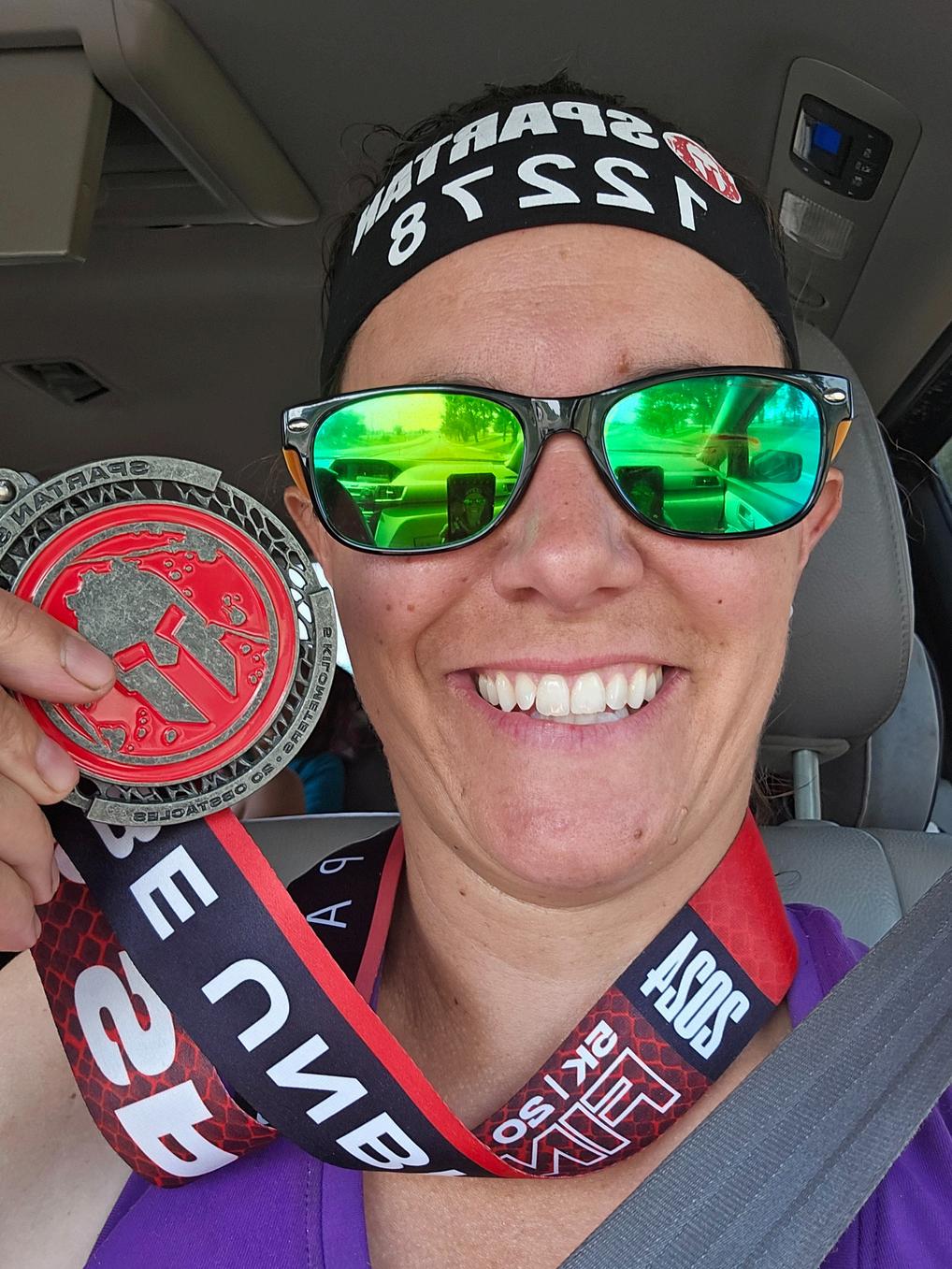
Sport was integral to developing the skills necessary to become who I am today. As a police officer, I work in a team environment, effectively manage my time, and communicate with various individuals in some of the most difficult situations I help them navigate challenges and find solutions through problem-solving When I chose my vocation, I aimed to be a force for good and a positive influence in my community I have personally experienced a vast spectrum of leadership throughout my career These experiences have allowed me to pursue opportunities to develop my own leadership skills I’ve learned that a true leader inspires, empowers, and energizes others to become leaders themselves I am grateful for the strong leaders in my life who have led by example and encouraged those in their command to become better than they were
Law enforcement is built on communication, leadership, teamwork, courage, and the ability to be both mentally and physically strong. My profession is dynamic and requires the same qualities of sportsmanship that I gained during my youth. Challenges are constant, yet in an ever-changing climate I choose to be resilient and steadfast in my choice. I learned early on that, “success is the sum of small efforts, repeated day in and day out.” - Robert Collier. With that quote in mind, I have continued my education and make daily efforts to connect with both my family and community.
This past year, I solidified my belief that sport connects people! I ran a Spartan race where people from all over Alberta challenged themselves to overcome personal and tangible obstacles. Intimidation was a factor but as the race went on, I witnessed strangers become friends and rally behind each other towards the common goal of finishing the race. As I embarked into unfamiliar territory, I was amazed at the encouragement and willingness of other athletes to utter words of reassurance and lend a helping hand when needed. Recently, I felt this community atmosphere again as I participated with local youth through basketball and soccer. Our initial interactions were minimal, but as the ball took the court and we delved into the game, sportsmanship, laughter, and competition took hold. With players spanning ages of 12 to 50, we laughed, exchanged high fives and encouraged one another while doing something we all loved, playing basketball.
As I became a mom, I recognized early on that community is essential to a growth mindset in youth. They say, “It takes a village,” and I 100% agree. As a parent, I wear many hats but oftentimes my kids will only recognize me as their mom. However, when it comes to other youth in my life they see me as a friend, mentor, and coach. This is why sport is important. Youth have the ability to build positive relationships while reinforcing the importance of effort. Confidence doesn’t just happen, it is built through hard work, pushing limits, and doing things you have never done before. Some of my kids’ proudest moments have been accomplishing a goal completely on their own. The part about competition and sport that I love the most is the thrill of the game. You can never be certain of the outcome but if you show up with a winning attitude, you can never truly lose because there is always something to gain. Serena Williams said, “A champion is defined not by their wins, but by how they can recover when they fall.” ALL youth need people who believe in them and want them to succeed.
My husband has watched as I’ve taken steps in the direction of my goals and conquered them, often telling me, “You can do anything!” He has also stood by during setbacks and has allowed me to navigate the difficulties that come with challenges I am a dreamer and always have been I have been told many times that I can’t do things but that usually only motivates me to work harder to overcome those obstacles As a mother, I want my children to have the courage to confidently take on adversity with discipline, hard work, and perseverance If youth truly understood their potential, they would stop at nothing to achieve their aspirations

I am a mother, a wife, an athlete, a police officer, a toastmaster, a mentor, and a friend These are just some of the roles I hold but I am, and will be, so much more Sport has provided me the latitude to choose wisely, to voice my opinion, and to build the confidence needed to become the individual I am today I encourage you to always Believe in Yourself and YOU will be unstoppable
A series featuring local first responders sharing their experience with sport, and how the skills learned through sport and active recreation impact their professional roles and life.
From Sport to Leadership Series 3 is a 3-part series of stories featuring local educators in our community sharing their experience with sport, and how the skills learned through sport and active recreation impact their professional roles and life.
Thank you to all our contributors for sharing their stories.

by Tracy Wong
Memories from my childhood are becoming less detailed and vivid as I appreciatively walk down the path of life. I can remember overarching themes; joyous time spent with my amazing parents and awesome big sister. Watching movies and eating A LOT of great food together, but as time passes some of the details become fuzzy. The memories of my childhood that remain very clear are connected to sport and activity I have vivid recollections of playing badminton with my dad in the backyard, riding my bike through North Lethbridge, and playing at all the parks near my home, in particular the park at Senator Buchanan Elementary School I remember feeling deep pride growing up on the North side of Lethbridge, I was proud of where I went to school, and the activities that I was privileged to participate in. This sense of pride was nurtured through sport.
As a young person I loved sport with all my heart. My first introduction to sport was through soccer. Soccer was a sport my Dad played as a young boy in Malaysia, and he shared that passion with me, something I will forever be grateful for (among so many other things my Dad has shared with me). I played Chargers soccer and looking back I am thankful for the experience to play for a club that nurtured strong female athletes and encouraged hard work, discipline, and excellence
My soccer experience led me to many sports opportunities, igniting a passion for pursuing physical challenges, goal setting, and a continued focus on growth. As I journeyed through school, playing sport was central to my identity. Wilson Junior High (now Wilson Middle School) provided me with opportunities to play volleyball, track and field, and badminton.

As I moved into high school at Winston Churchill, my commitment to volleyball only became stronger These opportunities came to fruition because of the dedicated and caring adults that volunteered their time to give kids opportunities to build skills, selfesteem, a sense of purpose, and a deep understanding of the importance of work ethic and cooperation
The time I spent as a student at Winston Churchill High School solidified my desire to pursue a career in teaching as a physical education teacher. The experiences I had as a student-athlete had a profound impact on my development as a human and I wanted to provide those same opportunities for kids just like me. I am grateful for the 10 years I spent coaching volleyball, it was through coaching I had the opportunity to meet and develop relationships with outstanding humans I feel lucky to stay in touch with many of the athletes I coached, many of whom are involved in coaching and promoting youth sport today
Although my participation in team sports halted after university, I developed a passion for running, biking, and strength training. I had the opportunity to represent Canada on the National Duathlon Team at two World Championships: in Switzerland and Belgium.
In my twenties marathon running and road cycling were my activities of choice. Those endurance sports no longer serve me, and I am now a deeply committed Peloton member and try to recruit as many friends as possible into this supportive and highly motivational fitness platform I enjoy time on my bicycle and feel privileged to explore the land we live on, the beautiful traditional territory of the Blackfoot people. We are so fortunate to have the coulees and the river bottom as places to explore and
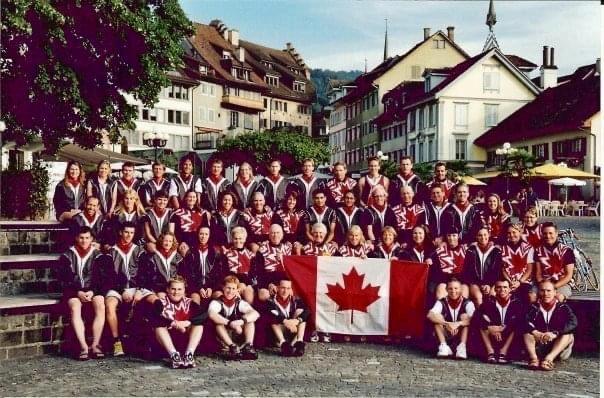
enjoy. Physical activity remains central to my identity and my wellness. It has been a constant in my life and in my career.
I am privileged to currently work as principal at Winston Churchill High School I am incredibly grateful for being able to return to the school that gave me so much and contributed to my development. I get to work with 930 awesome young people and 85 adults that demonstrate deep care for kids every day. We believe in providing kids opportunities to engage in sport, fine arts, and extra-curricular activities that enrich lives and support growth and learning.
When I reflect on how my experiences in sport shaped my development as a person and how those experiences continue to contribute to my role as a school leader, I am even more grateful for sport.
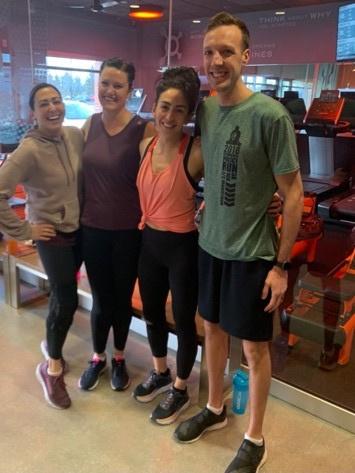
Leadership is complex It involves developing an agreed-upon purpose that all members of the organization understand and believe in as the common why. This common purpose brings direction, unity, and motivation. Committing to and working for this common purpose creates community and offers a sense of stability. Everyone in the organization understands the filter used when making decisions and where the organization is going. The commitment to the common purpose, the why remains constant every day. On good days, and on not-so-good days
As a school leader and teacher, I believe developing positive, meaningful relationships for the purpose of learning are essential For me, relationships involve care, curiosity, reciprocity, and trust These strong relationships create an environment where individuals thrive, take risks, are curious, feel supported, and continually pursue growth.
A series featuring local educators sharing their experience with sport, and how the skills learned through sport and active recreation impact their professional roles and life.
So how does this connect to my experiences in sport? As a member of a team, it was essential that I build relationships with my fellow teammates The importance of working hard for your teammates, and supporting them through moments of frustration, disappointment, and joy was central to being a great teammate. As a team, it was essential that we work together, toward a common purpose. As an individual pursuing active recreation, I need to know my why. Knowing my why, and committing to a purpose motivates me to train on days when I am tired, and weary, or on days when I feel like I am not moving forward toward my goal. That sense of purpose creates drive, in sport and in an
Sport also taught me that I can do hard things, and that I am built to do hard things.
Participation in sport gave me the confidence to understand that hard work and commitment lead to growth. The ability to push your body physically and mentally, beyond limits that have been set for you allow you to see what you are capable of in all aspects of your life This learning inspires you to ask, what is possible?
Participation in sport and activity teaches me every day that it is a privilege to move my body Even on tough days The idea that I get to participate, I get to train rather than I must, sets the foundation for how I view the world and my role in leadership. I see my professional work through this same lens. It is a privilege to be a teacher and principal. I get to work with students, staff, and families during great and during complex times.
Sport fundamentally shaped who I am and how I v importance of cooperation, collaboration, hard wor aim to be better every day, your habit of mind is lea mind remains oriented to learning and growing. Sp g y p y directly translated to giving me the confidence to take risks in other areas of my life, and to push limits and expectations in the pursuit of an identified purpose.
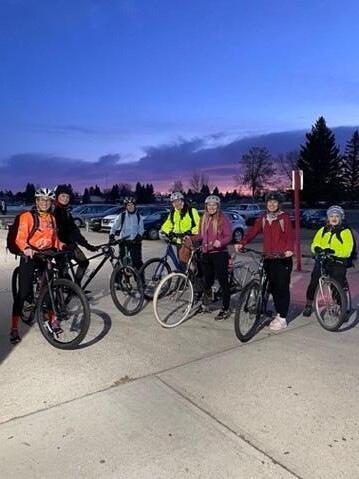
A series featuring local educators sharing their experience with sport, and how the skills learned through sport and active recreation impact their professional roles and life.
by Alexa Koshman
Sport is more than just a game. It is a way to build character, perseverance, and comradery. Some of my best memories, best friendships, and best lessons come from playing team sports for 15 years. I recognize that I am extremely privileged to have had such a positive experience with sport and I will be forever thankful for I did, as it transformed me into the person I am today.
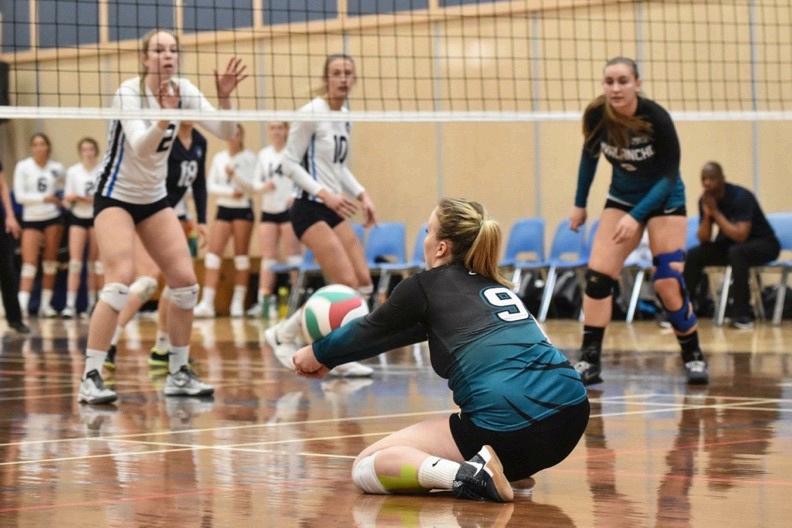
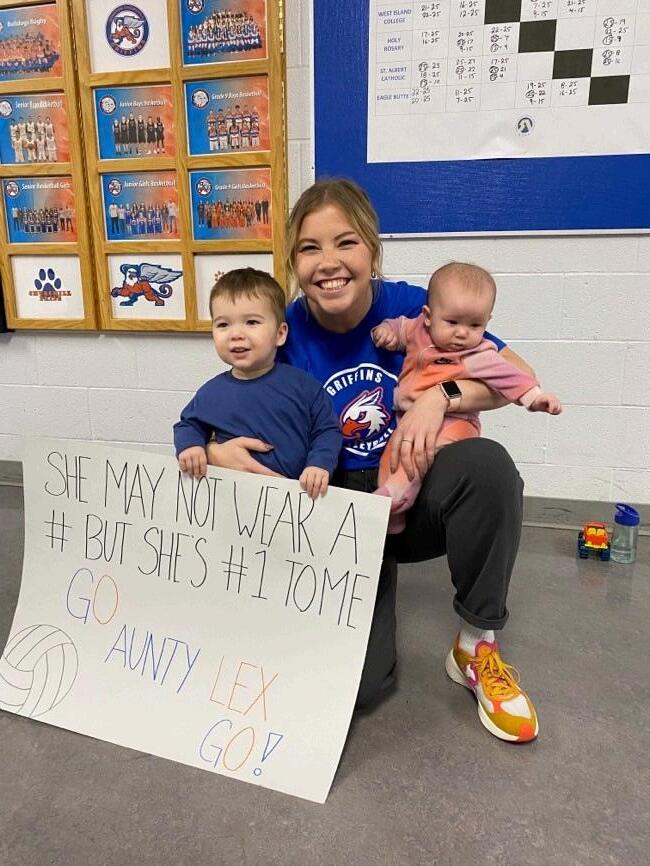
I started playing volleyball when I was in Grade 6 and continued to play four years of collegiate volleyball. Although I played other sports, volleyball consistently stole my heart. For as long as I can remember, I would eat, sleep, and breathe volleyball. One year for my birthday, I got a personalized volleyball, and you would have sworn I had just won the lottery. From September to May, my life revolved around the sport. Although there were moments of extreme exhaustion, frustration, and doubt, the successes and joys outweighed all the bad.
However, it wasn’t always sunshine and rainbows as there was a brief time when I lost my love for the game. I resented going to practice, couldn’t find the joy when I played, and beat myself up mentally when I made a mistake. In Grade 10, I let the mental aspect of the game consume me. I would tell myself things like “you can’t do anything”, “you don’t deserve to be on the court”, and “why are you even trying”. I would cry, and pout, and made it all about myself. I can remember one practice from high school when I had mentally exploded, and my coach kicked me out of practice. I was so infuriated at the time and thought the world was against me. It took a lot of tough love for me to realize that like volleyball, my mental strength also need practice. So often, this aspect of the sport is overlooked. I make it a point now of including classroom sessions into my weekly practice schedule for my players to help build them with the skill set to be mentally solid. To me, there is truly nothing worse than when players quit playing because they lost the love for the game.
In addition, anyone in the world of sport knows that it is impossible to do it alone. Throughout my volleyball career I had multiple individuals that helped me along the way, but Jamie Bach was the one person that truly shaped me into the person I am today. Jamie was my club volleyball coach from Grade 7 to Grade 12 as well as my high school coach for 3 years. I will forever be appreciative of the time, effort, and care that he invested in me. Much of my coaching philosophy now is built from the leadership that Jamie exemplified on a day-to-day basis.
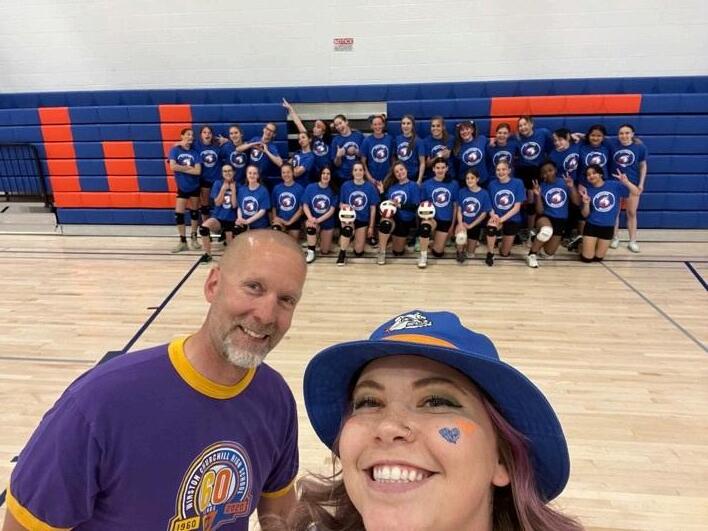
Currently, I coach the senior Griffins volleyball team at Winston Churchill High School here in Lethbridge. I have been in this role for the past 3 years and plan to stay for many more. My goal is to build a program that my players are proud to be a part of. To be a Griffin volleyball player, is more than just wearing orange and blue. It is being a leader on and off the court, it is striving for success in all aspects of life, and it is putting love and care into everything that you do. I want my players to understand that the lessons you learn from sport will carry you through the rest of your life. Too often do people underestimate the power of a team because even during the toughest parts of playing a sport, you will learn leadership, grace, and the importance of teamwork.
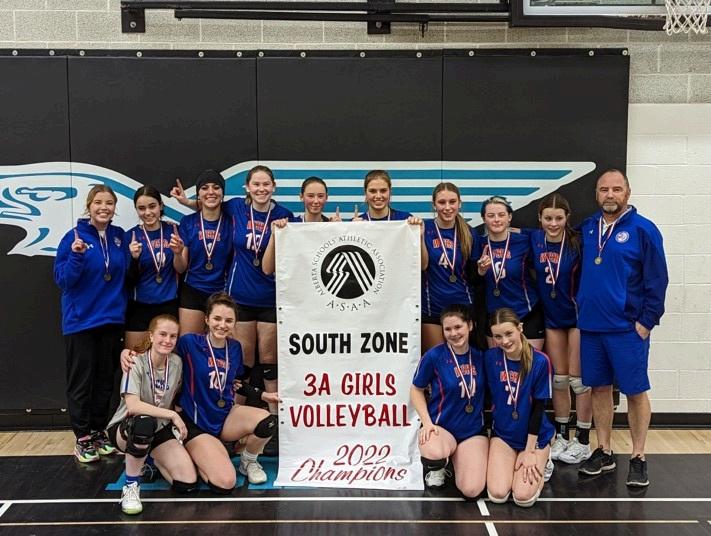
Much like when I was an athlete, coaching also takes a village. Looking at my current program, I am extremely lucky to work alongside committed individuals who have bought in to what I am trying to achieve. Luckily enough, I get to coach with Jamie now, my mentor growing up. Another person who I am so grateful to coach with is my dad, Terence Koshman. When I was an athlete, my dad supported me and pushed me in every path that I took. Now as a coach, I get to see him put the same love and care into our Griffin program
Lastly, I am a firm believer in that you need to give back to the community that gave so much growing up. My goal as a coach now is help youth maintain a love for the game and the learning that comes with it. As much as I miss playing volleyball, there is something special to me about coaching. If I can have a profound impact on even just one of my players, I have done my job. Going back to my first point, sport goes so much deeper than the game itself. It gives you family, friends, confidence, opportunities, and memories that last a lifetime. I am truly honored and proud to be a part of the sporting community.
A series featuring local educators sharing their experience with sport, and how the skills learned through sport and active recreation impact their professional roles and life.
by Kristi Legge
Throughout my life experiences I have come to learn the positive influence dance has on any community. People of all ages have experienced the social, emotional, intellectual, and physical health benefits of dance. I feel so grateful to have had the opportunity to watch students and communities flourish during my twenty-five years as a dance educator.
Growing up I was very fortunate to have been able to train competitively and study the disciplines of Jazz, R.A.D. Ballet, Lyrical and Hip-Hop with Showtime Dance Productions for over 10 years. After graduation, I continued to pursue my dance studies in Calgary and attended teacher workshops when possible in New York. I also started my post secondary education and accepted an internship in the Florida Keys. This was the one time in my life when I wasn’t dancing and although I was living in one of the most beautiful places on earth, I felt like a big part of me was missing. After I completed the internship I moved back to Canada, finished my Kinesiology degree and started my Bachelor of Education at the University of Lethbridge. As a university student in Lethbridge, I found there were limited opportunities for dancers in their early twenties. I decided to start up a dance program at the University of Lethbridge. The company flourished and I felt so much more joy having a strong connection to a dance community. I was the director and owner of the company for ten years and I am still connected with some of the dancers to this day.

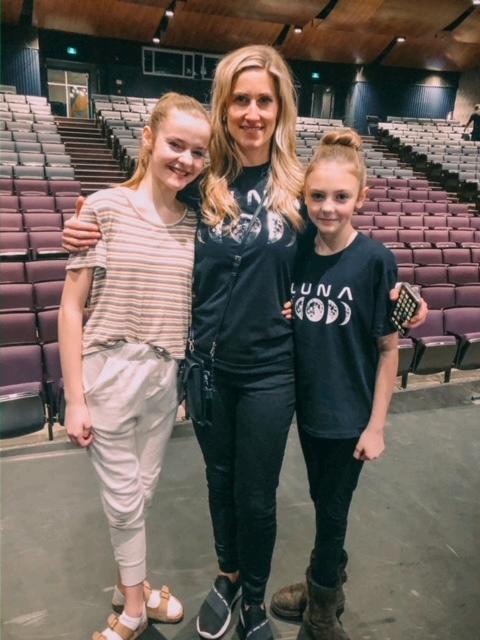
During my last year of studies at the University of Lethbridge, I received my final professional semester placement at G.S. Lakie Middle School. I basically equate this opportunity to winning the lottery. This was a new vibrant school bursting with energy and innovative ideas, thanks to the creative leader and Principal, Doug James. He found teachers and support staff that were passionate and he did what ever he could to help their dreams come true. I never thought in a million years I would eventually have the opportunity to create a full-time dance program within a middle school. Thanks to a very supportive atmosphere and a little hard work, the G.S. Lakie dance program was born. The program evolved from a small classroom with a boom box to a state-of-theart dance room equipped with a sound system, stage lighting, convertible theatre and best of all, over 300 eager dance students.
I can honestly say these past 17 years at G.S. Lakie Middle School have been some of the most rewarding and memorable times of my life. I have had so many open doors and opportunities thanks to dance and our school community. There are many highlights throughout my career that have created vivid lifelong memories. I will never forget the proud moments watching students overcome their fears of performing onstage. Feeling the strong sense of community and belonging students had after working together as a performance ensemble. I still to this day experience the joy of having a team of staff that feel more like family than they do co-workers. This is because I am surrounded by people who care, people who want to help make this world a better place by being there for our future generations.
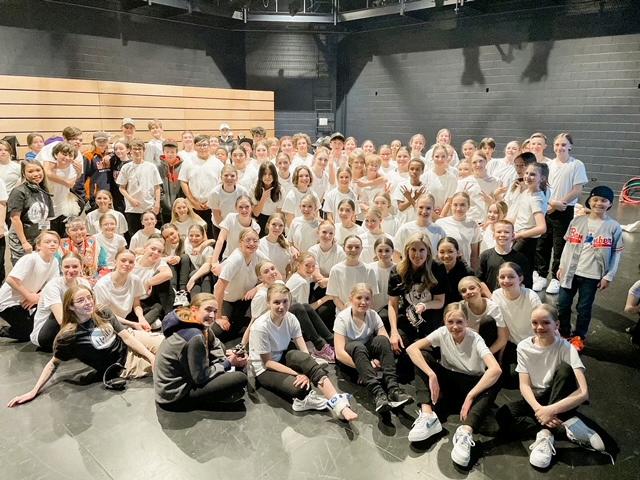
Dance is a historical reflection of the social, political, and cultural movements over time. To develop a greater appreciation, I wanted Lakie dance students to get a new perspective and learn from authentic experiences by extending the walls of the classroom to explore other dance cultures and communities. What better place to do this than the “Big Apple!” (New York). Unfortunately, this had not been done

I will always remember the excitement of seeing New York City through the eyes of a middle school student, who had never even been on an airplane before. Watching real buskers perform on the streets had our Lakie Gators in awe. I loved how inspired our students were seeing stars like, Lin Manuel Miranda perform live on Broadway during “In the Heights” Learning about fundamentals of traditional West African “Sinte” dance with an emphasis on an understanding of the accompanying live drum rhythms in the beautiful Alvin Ailey studio was an epic experience Stepping out onto the Radio City stage and giving the students the dancers perspective was a sight to see Being in the same city as DJ “Cool Herc” where Breakin’ was born, this was an honour in itself I am so grateful for these travel opportunities and I am hoping I continue to have the opportunity to create new ones with our students
The highlights of my teaching career are endless! Watching our Lakie gators dance side by side the Harlem Globetrotters on tour Seeing our students in awe when they got to meet Lex Ishimoto and Travis Wall after their spectacular performance of “Shaping Sound”. Meeting up with one of the performers from Alberta Ballet after their stunning performance of “A Midsummer Night’s Dream.” Teaming up with the “World drumming group” and the University of Lethbridge to choreograph a flash mob to welcome the new university president performed by G.S. Lakie and U of L dance students. Taking the dance students to see a live Break battle in Calgary was something I will never forget. Partnering up with a high school to create an alumni mentorship program and bring in renowned guest choreographers from all over Canada Creating an original musical with talented and passionate colleagues The list of positive memories is always ongoing when you work in a vibrant school with active and engaged staff and students

As we embarked on the year 2020, the next chapter of my life as a teacher looked much different Seeing students through a computer screen during COVID restrictions was heartbreaking I believe physical and mental wellness are strongly connected and many of our students were not very active during Covid Our staff did perceive an increase in depression, anxiety, and withdrawal from our students during this time In addition to the stress caused by a pandemic, I am convinced that the lack of physical activity lead to an increase in these negative thoughts and actions I was so grateful to get my program back after restrictions lifted.
Dance has a way of connecting the mind, body, and spirit It is far too common for this young generation to be glued in front of a screen Video games, streaming platforms and social media have become an addiction for many. Giving students the opportunity to dance within the school day can improve their confidence, coordination, balance, strength, stamina, flexibility, discipline, connection, cognitive function and it reduces their screen time!
I am so grateful I got to spend the last three decades of my life learning more about the wonders of dance. It is an evolving language beyond words that builds community and improves mental, physical, and emotional wellness.
A series featuring local educators sharing their experience with sport, and how the skills learned through sport and active recreation impact their professional roles and life.
From Sport to Leadership Series 2 is a 4-part series of stories featuring local men in our community sharing their experience with sport, and how the skills learned through sport and active recreation impact their professional roles and life.
Thank you to all our community leaders for sharing their stories.

By Shawn Daye-Finley
I believe there are no greater experiences for connecting youth to positive influential role models, nor for creating growth towards confident and competent leaders as is found in sports participation; further, there is no greater way to teach life skills that have a more positive impact on a child's development, contributing to a healthier community, than is provided by sports For those reasons and many more, I choose to give my time and energy to sport. I do this so I may pass on lessons that help carry me through life.
I’m no longer an athlete. I’m the Program and Event Coordinator for the Lethbridge Sport Council and a paid wrestling coach. I’m fortunate enough to do what I love and call it work. I have been able to earn and sustain these types of leadership roles in large part due to personal qualities instilled in me through my experiences in sport. Sports have shaped my life unlike anything else. I’ve identified myself through sports, which has proven detrimental at times but has also been very rewarding in my lifetime. At 32, my career is still based around sports, and I’ve been emotionally and physically invested in it since I can remember.
I didn’t always feel as strongly positive about sports as I do now. I struggled in school because of my slow physical development and my inability to focus in the classroom setting. I still set goals for myself that may be unattainable in my lifetime, knowing that the true rewards are the lessons learned in pursuing those dreams.
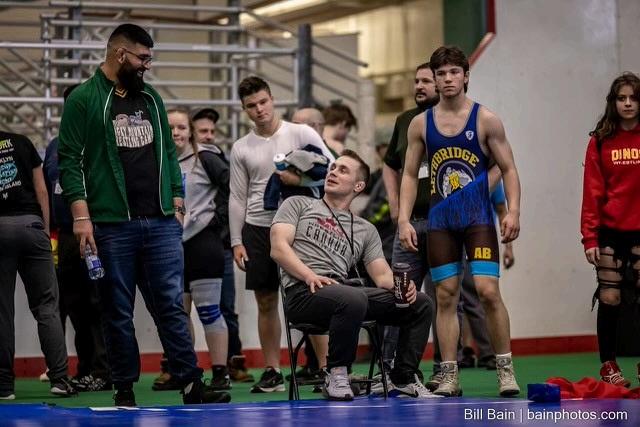
I was raised by a single mother of two. She worked hard to produce opportunities for my sister with special needs and me. She always kept us busy with extracurricular activities, including sports. She believed we needed to “ run the stink off of us ” . I learned that I could focus better when I had run the energy off. Initially, she saw sports as a means to teach me discipline She enrolled me in Karate at the age of 5. I excelled at it and, before long, was encouraged to enter competitions. I sparred at a young age and earned medals in both the sparring and routines. Those medals represent my earliest experiences in the relationship between work and reward, which I have instilled in me since.
I started my journey in team sports when I was invited by my best friend to join his minor hockey team. It was a recreation league, and we were defensive partners for a couple of years together. The lessons I learned from that coach are still remembered and applied to my life today, including how to be a better student. He once arranged for a few players and me to watch Sidney Crosby play when he was bantam-aged playing in the midget AAA finals.
Coach had us take note pads and record details about his play I remember Sydney got 7 points that game, two goals, and five assists He had no line/shift partners; when the coach touched his shoulder, he would hit the ice and was usually already on the bench when a goal was scored from his pass. I observed at that game that Sidney saw things differently than other players; he wasn’t scared to play differently or without a specific line or group of players.
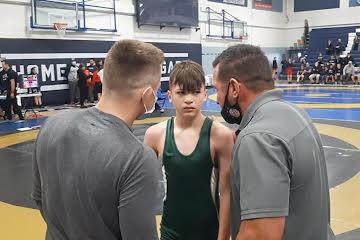
Sidney knew hockey so well that he could think outside of the box and make plays that others could not imagine possible. Being able to know a game so well that you can be innovative in your strategies to win was inspirational to me I eventually gave up on hockey in pursuit of other opportunities but never forgot the lessons learned from that sport and those coaches.
Shortly after leaving hockey, I started picking up every sport I could imagine; the addiction to sport as a means to selfmedicate my overactive mind began. The fear of competition left me, and I was open to just about any game that someone invited me to play or had opportunities to aspire to. I played volleyball, wrestling, cross country, and track and field events, including javelin and rugby. I swam semi-competitively for a while, too, earning my lifeguarding certification. My mother grew up afraid of the water, so this was for her more than it was for me.
So When my me-maw was looking for a summer activity to keep me out of trouble, we landed on a ‘sprint canoe/kayak’ program Mom could drop me off each morning at the paddling club, happily named MicMac Amateur Aquatic Club, and pick me up on her way home from work. Eventually, I would bicycle the 10.5kms to and from the club so I could practice longer than her workday and get some extra cardio in.
She said it was great for me to be outside all summer, just running, paddling, swimming, and being with friends. I have never been in better shape in my life than when I was paddling my summers away. The training was out of this world. Paddling was a perfect summer sport for me.
I went on to be quite successful in paddling. My wrestling coach had to call and discuss what was best for my future openly with my paddling coach and ask him if it was worth it for me to pick one over the other in my grade 11 year. I was medaling in both at national events regularly. The big difference maker was that my national medals in paddling were in team boats and not individual performances. I won several dragon boat, war canoe, and 4 person canoe medals at our national championships and had some potential to go further but nothing like the opportunities that had been presented in wrestling Another deciding factor that eventually led me to pursue senior wrestling over paddling was the opportunity to study a post-secondary education while competing for a varsity wrestling program. There are no varsity canoe/kayak programs in Canada and that reality ultimately led to my final decision.
Wrestling was the sport. I started it in grade 7. I come from a rather large family and was the second youngest of 7 cousins who all competed in wrestling. I couldn’t wait to be able to practice and train the techniques of wrestling so I could protect myself against family members who were almost always roughhousing. We were a rough, tough group of kids and wrestling was/is our natural form of play.
For me wrestling was and still is life. My coaches presented it as such, always exclaiming that it was a metaphor for life and that after wrestling everything else in life comes easy Now in my retirement I couldn’t agree more. We are taught to embrace uncomfortable situations and to learn to work through them like a problem that just needs solving. We were taught to be students of the sport and to have a growth mindset that I still apply to everything I do today.
A growth mindset learns from criticism or failure, a mindset constantly evolving and expanding. All of my lifelong friends have come through wrestling. I can honestly say that no matter where in the globe, I can rely on wrestlers to be there for me when I’m in need. I say this with confidence because I’ve put it to the test over the years.
I’m a paid wrestling coach now, which isn’t common in Canada It makes me proud to say that, not just for myself but for my sport that is considered niche here. Amateur sports are viewed as extracurriculars in Canada. We treated it as anything but extracurricular in my wrestling club. It was a lifestyle, a job, and a religion. Wrestling is a way of life. In my career, I medaled in and won several national titles. I wrestled at the varsity level and won several CIS nationals (now U Sports). I was taught to think of the CIS nationals as a stepping stone to my true goal. I wanted to be an Olympian, and in order to accomplish that, I damn-well better accomplish the other first. My most recent international performance earned me Bronze at the Senior Pan Am Championships in Lima, Peru.
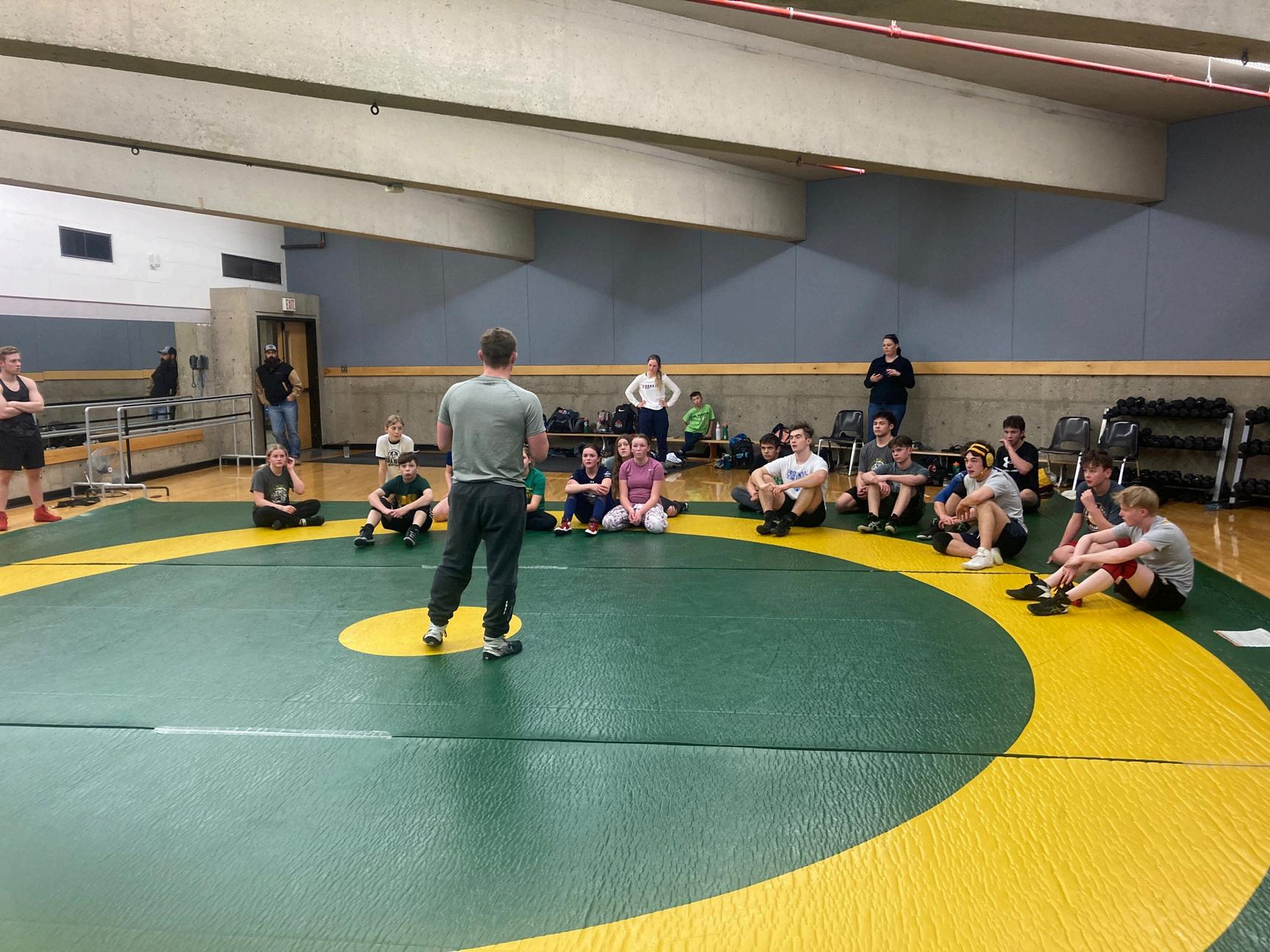
Canada Wrestling had decided that we would be represented at the pan am qualifiers by the number one in each weight class from our country. I had made it to that position twice in my career, earning the role for both London and Brazil Olympic qualification events. The closest I ever came was 5th at the Olympic qualifiers. Two matches away from earning my spot in the finals and an Olympic berth. I wish more than anything to go back to those moments and make different decisions in the matches to lead me down another path But just like in life we don’t get second chances and the lessons from failure are ours to live with, learn from and improve on.
Wrestling is most popular in the oldest cultures and countries, especially around the middle east and ex-soviet nations The Olympics is the pinnacle of the sport; that’s why it’s traditionally referred to as ‘Olympic Wrestling’. In each Olympics, only the top 16 competitors/countries in the world in each weight class get to compete. This means you can be the best in your country named to the Olympic team and still not compete at the Games. I was in that boat. I was named to the Greco-Roman national team and was an alternate for the Freestyle team In Greco, I made it to the final qualifications for the Olympics, where the top two countries at the pan am qualification event qualify their country for a spot at the Olympics in their weight category. The only other way for a panAmerican country to qualify for the Olympic Games is to place top 8 at the world championships the year before the games or at another open qualifying tournament, which are both difficult to do
It is these lessons that shape us. I believe that anything we want in life is attainable if we put enough time and effort towards the goal. We all know that some things take longer for some people than others, and that’s okay as long as you keep working, developing, growing, and learning. We also know that some people have more to give than others, that’s okay too if you ’ re doing your best to improve. Sports will help people come to grips with these lessons or realities early in life. Lessons on failures and honoring or celebrating your failures through learning and growing. This creates leadership qualities in sport participants that are hard to find elsewhere.
To be a good leader you must know where you ’ re going Shaping your identity around attainable, tangible, logical, and process-oriented goals is a great way to live and keeps us in the growth mindset. I encourage anyone with a bucket list to get started and don’t wait, life’s far too short. Sports have given me everything I’ve ever had, or rather sport has gifted me the tools to go out into the world and earn whatever I desire. I still have much to learn in my career but the fear of failure is one hurdle I won’t steer away from, I have sports to thank for that
By Chris Witkowski
My introduction to sports was as a dreamer in my formative years in the manufacturing town of Naugatuck, Connecticut in the 1980s. I desperately wanted to play goalie for the Hartford Whalers, score a basket alongside Larry Bird, or hit a world series homerun for the New York Mets. But here’s the thing…I couldn’t ice skate; my career youth basketball stats were two points and one rebound; and God help me if I had to hit a baseball. Consequently, I had to adjust my ambitions and look elsewhere for athletic satisfaction…life lesson #1.
My true introduction to sport participation came in Grade 9. One of the teachers walked up to me at my locker and said, “I’ve seen you in the hallway and I think you’d be a great fit to my team. How’d you like to join cross country?” Stunned, I blurted out, “Sure!” Then I went home and asked my Dad what cross country was. When he said, “running in the woods”, I thought, “Ok, I can do that.” From that point on, my life was forever changed. The training, discipline and visioning exercises required to compete in running has shaped the person I’ve come to be. In high school, running gave me confidence. It introduced me to other endurance sports like hiking, cycling, swimming, and the work ethic it takes to even partially succeed at any of them. It taught me how to deal with success and, conversely, how to work through failure.It made me learn when to push through pain and when to ease up. It turned a skinny, shy, awkward kid into a…well, still skinny, shy, awkward kid…but one that learned how to push his limits and not to fear new endeavors.
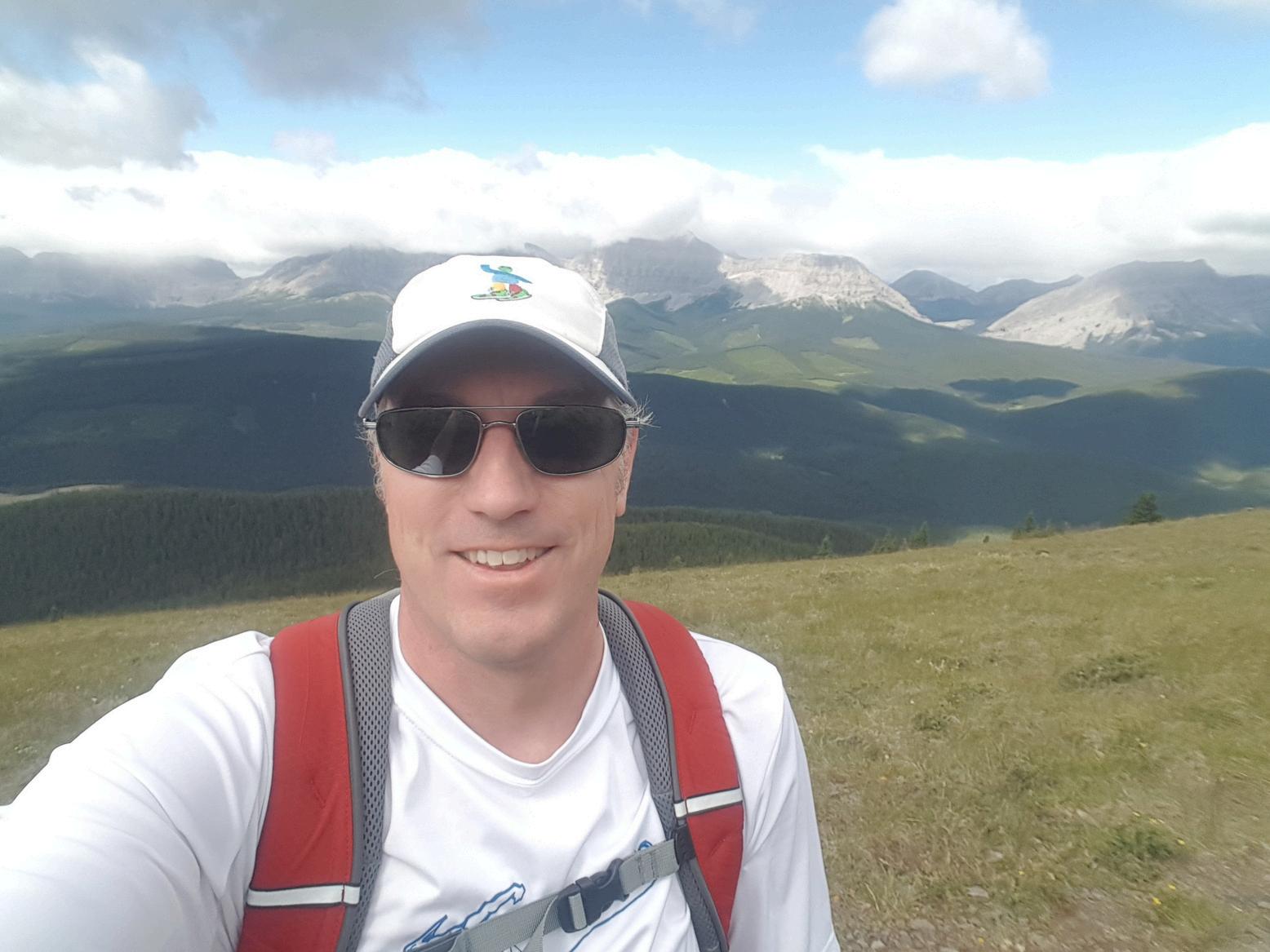
At one of my races, my uncle said to me, “Chris, you need to run through the finish line, not to it. Envision a point beyond the finish and charge to that spot.” Years later, I still take a visioning approach to every major work project or life decision by envisioning a point beyond the finish. When I chaired the Board of Directors for the 2020/21 Alberta Summer Games, I encouraged all the portfolio directors to envision a moment beyond the end of the Games and ask themselves, “What do I hope to achieve through these Games?” (In case you ’ re wondering, NOBODY said, “I envision a global pandemic!”). By Grade 12 I became captain of the high school cross country and track teams, which introduced me to my first stints in a leadership role.
Now, to be clear, I was not an all-star runner. I was never going to challenge for a win. Mid-pack…er, drafting…was my specialty. So I remember clearly the day the coach announced to the track team that I was going to be captain. My teammate said to me, “Why you? You’re not even a good runner. ” That really bothered me (and still now, I suppose, because I remember it 30 years later!). I thought, “Why did Coach pick me? What does he see in me? What can I do for the team if I’m not winning races?” Well, I found out through the course of the season that winning didn’t make me a leader. Instead, it came down to pushing the other athletes in practice; putting in the effort on the nice days as well as those cold, wet, miserable spring afternoons; mixing levity with solemnity; setting up for meets; and encouraging every teammate on race day.
In essence, leadership is often about showing up, which is an attribute I’ve carried with me through my career, volunteer activities, and family life. In my early twenties, I finally pursued that goalie dream. Ice rinks weren’t a common element in Naugatuck, so I drove 75 minutes one way every Sunday night to play in a structured league in an open-air rink.
The first time I took the ice, I didn’t even know how to skate backwards, but I just figured what better time to learn than in the face of pressure?!? In that initial outing, I gave up double digit goals – in the first period – but, in a few years, I backstopped a shutout in the championship game. Over those years, playing goalie taught me to be patient, slow my thinking in the midst of chaos, and to never panic. Those are traits I use every day, whether working with colleagues, volunteers, customers, or family. Often, it comes down to slowing the moment, never panicking, and making the best decision based on what’s in front of me.
In 2013 I ran the New York City Marathon. It was a race that intrigued me since I was a kid, when I would stare at the race map hanging in my uncle’s home office. Like any marathon, I trained for months and envisioned that moment of running through the finish line. Two months before the start, I got injured and barely made it to the start line. I had to start walking at mile 9 of 26 and felt devastated that my dream was falling apart. I was dejected and hurt but I persevered while taking in the sights of Brooklyn, Queens, Bronx and Manhattan. I listened to strangers cheer me on and relished running (ok, walking) on the closed streets in one of the world’s greatest cities. After five hours, I crossed the finish line in 39,329th place out of 53,000+ runners. There’s no prize money for that. It was one of the worst athletic days I ever had, yet one of the best days of my life. I found success in failure. That’s a reminder I have to give myself quite often since life rarely goes as planned.
Those experiences have been great lessons for me and have made me come to several realizations in adulthood: new opportunities don’t scare me, so many life lessons come through sport, and I’m never going to make a living off my athletic prowess. Given that last fact, the last twelve years of my career have been dedicated to municipal government, with stints in land surveying and civil engineering before that.
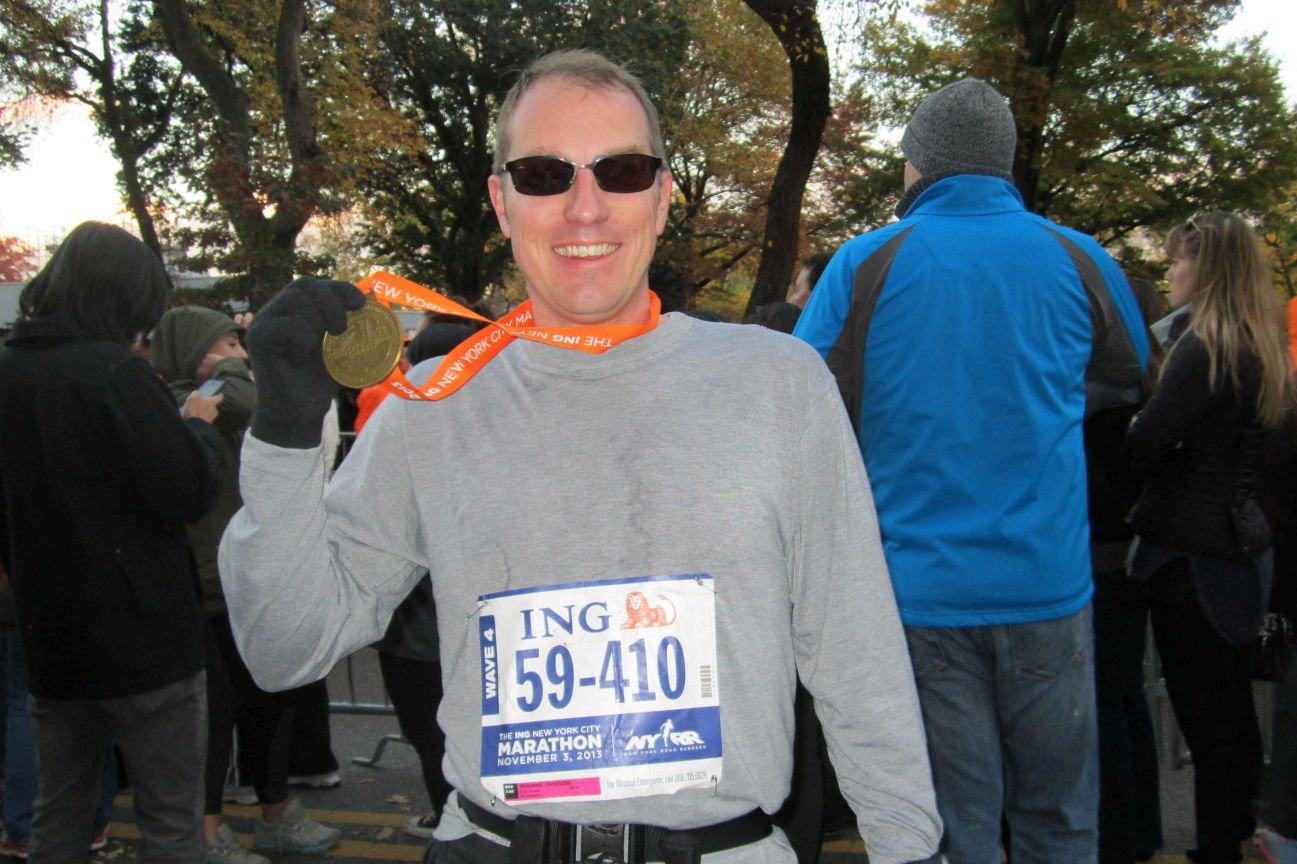
All those sports experiences have helped me learn how to take a long term approach to my career, persevere through the tough moments, know when to push my boundaries, understand the influence I can have amongst those in my inner circle, find the balance between dream and reality, and handle the pressures that come with inquiries and critique from municipal leaders and residents. Perhaps, best of all, while sports shaped my career, my career has also uncovered a new passion for me in the sporting world - event management and administration.
Largely through my job, I have been extremely fortunate to sit on sport boards, coach my kids’ basketball teams and take on leadership roles in the Lethbridge stages of the 2014 & 2016 Tour of Alberta pro cycling race and 2020/21 Alberta Summer Games (ASG) Society. Similar to the physical aspects of sports, organizing large scale events have taught me that training and practice lead to success. Through these endeavors, I’ve learned how to quickly process information and make informed decisions, collaborate with stakeholders, inspire teams, make mistakes and recover, be confident while also being humble, and stand in the background while others shine. Leadership doesn’t have to come from standing on the podium.
These roles taught me more than anything else that leadership is often about exposing your vulnerabilities and understanding your strengths and weaknesses. I’m not a slick individual. I won’t knock your socks off the first time we meet. But give me time and you’ll see my strengths. I joked with the ASG team that I’m like a rash; you won’t really notice me at first but, over time, I’ll grow on you and you’ll be forced to pay attention! That’s who I am and I’m happy about it. I don’t need to light the world on fire. I’d rather put in the work and dedication to be a positive influence to those around me. Sports taught me that.
Perhaps comparing oneself to a rash is not the standard recipe for success, but sports have made me comfortable with who I am. I’ve taken my lumps in the athletic world, made mistakes at work, been passed over for promotions, and questioned some of my decisions as a parent. But I’ve also conquered some athletic feats that most people won’t even try, have a network of respected peers at work, and have managed to not lose or ruin my kids (yet). And somebody thought enough of my skills to ask me to write this story, so I’m doing something right.
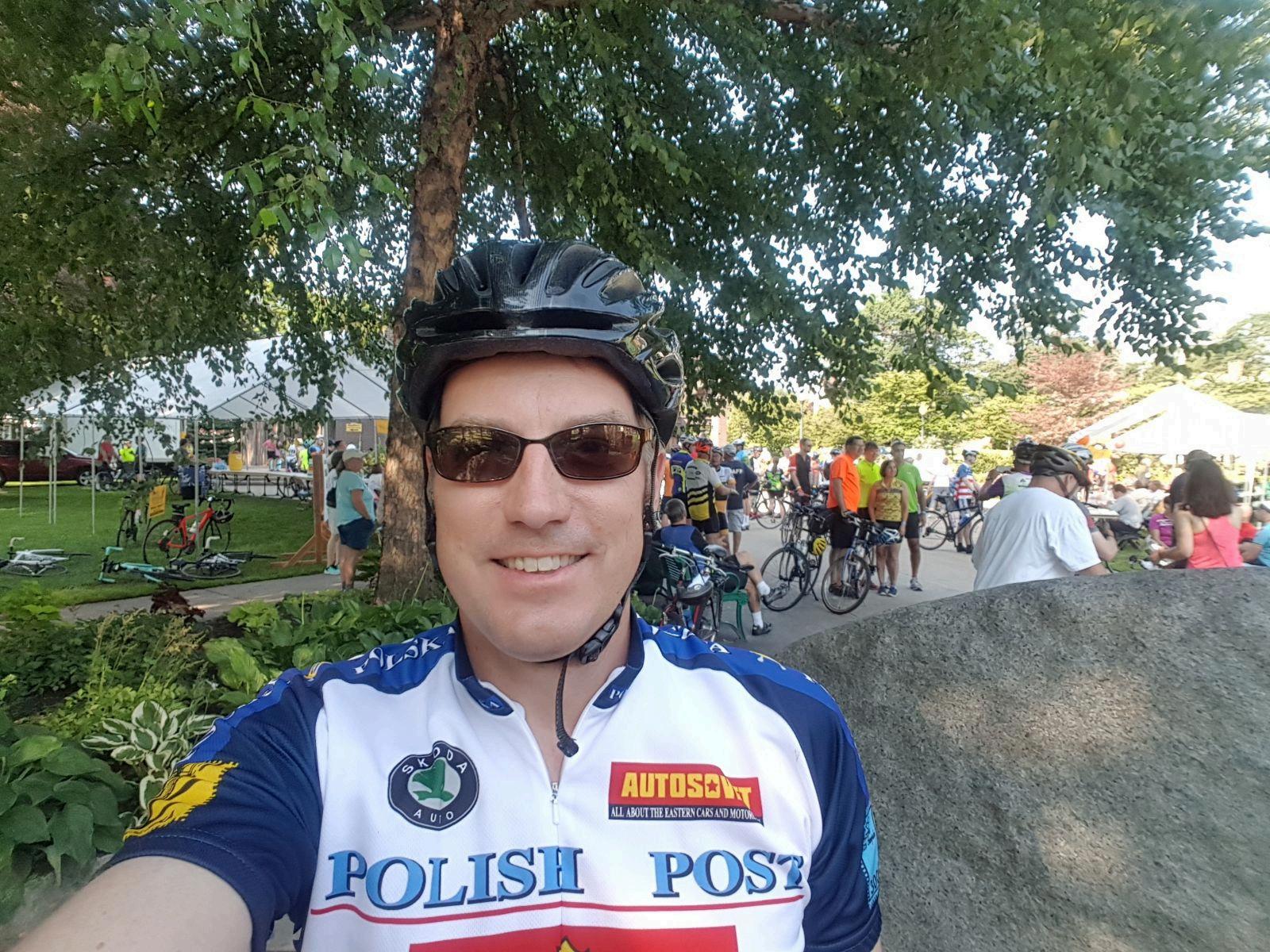
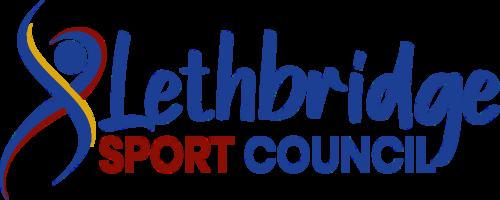
For all of the above, I have sports to thank for a good chunk of it. I will always look for those new opportunities that push me further, both inside of sport and out. When life gets hard, I know I can burn off steam on a run or pedal away my frustrations on the bike. There is a yet-to-be discovered event waiting for me, a new sport leadership role to take on, career goals to achieve, and still lots to learn in life. I’m confident that sports will be at the center of it all. And maybe –just maybe – a reader or two of this story will be inspired to try something new, even if they have to finish in 39,329th place.
By Dylan Tait
My name is Dylan Tait. Forewarning: I think it’s going to feel a little weird for me to talk about myself, as I’m typically a pretty private human. Especially on the internet. That (this?) place can be really cool but it also scares the s&^t out of me sometimes. Social media included. Facebook was the source of some conflict so I ditched that a long time ago, and neither Twitter nor Insta held my attention for long. I’ll confess to giving in to my Snapchat vices though, some accounts on there (e.g., Forged in Fire) just got me hooked. Regardless, it is necessary for one to forego frivolous Facebook notifications to survive the rigors of Skyrim. One does not become the Archmage of the College of Winterhold while “cruising the ‘Gram” or by Tweeting about it. Oh yeah and I forgot for just one short moment that it’s also especially a good idea to reduce distractions (like social media) when one is studying for the Examination for Professional Practice in Psychology (EPPP)! That’s very important. Especially when one is putting their writing on the internet where one ’ s supervisors may see it and make incorrect inferences regarding their supervisee’s priorities…

thank you to whoever did the “identifying”, your vote of confidence is much appreciated ☺. Now I have been tasked with sharing “ my story as a male, athlete, (‘and other roles’), and a leader”. 1-3 pages. Challenge accepted. Apologies for: the tangents; the “quotations; the italics; the brackets (I like brackets); the ☺’ s (I like smiles too ☺); and the lols.
I plan to take advantage of this opportunity to share some writing that is not being graded for any particular reason, as that is a rare and unique experience for me ☺.
Regardless of my preferred self-care practices, I have also been identified as a “local male leader that [has] used skills learned through sport and active recreation [tangent: that’s a fun word I’ve been ruminating on recently: recreation. If you ’ re a curious human {like me}, I recommend looking that word {and it’s origins} up in a dictionary ☺] in their professional leadership roles and life in general”. Well,
I like to think that “ my story” is pretty interesting. I like to think that I’ve had some fairly unique experiences in my 30 years on this beautiful planet, both within and without the world of sport. I have played a few different roles in my story thus far, “teammate” being central. Hockey is my sport of choice (I was a goalie [don’t let your kids be goalies {matter of fact, maybe don’t let your kids be hockey players, I hear registration fees are WILDLY expensive}]), although I’ve been watching a lot of basketball lately and hot damn that has been fun. Notable “and other roles” I’ve played would include: son, brother, friend, reader, student, athlete, student athlete, husband, uncle, dogfather, employee, ally, father, human ☺. “Fun haver”? “Haver of fun”?
Whatever, I friggen love having fun (tangent: sport was almost always fun for me [and sometimes it really wasn’t, but regardless…], but I think the process of “playing” sports taught me how to play and have fun in other ways too ☺). Fulfilling the aforementioned roles has provided me with some unforgettable experiences. Some were incredibly joyful, some were incredibly painful.
Quite frankly, some were really odd and/or humorous “in-betweens”, both joyful and painful together in a neatly amalgamated gestalt ☺ (e.g., “Apple juice and barium please, easy on the AJ”; “Wait, did he just say ‘left’? Aren’t we removing the RIGHT one!?”). Sometimes hockey was the cause of the pain. Getting cut sucked. Backing up sucked (most of the time… I still managed to have lots of fun).
However, I was lucky enough to have friends, interests, and abilities outside the world of hockey as well. I could always find solace in reading and learning, and these activities provided me with some healthy distraction if things at the rink weren’t going well. More often than not though, sport (especially hockey) helped keep me grounded.
When needed, hockey and other recreation gave (and continues to give) me structure and routine, cognitive distraction, emotional regulation, and physical release via movement and play (i.e., playing games I love makes me feel good ☺). When needed, hockey provided me the inherent support that I think came with belonging to a team or community.
Iwasluckytoplayonamazingteamswith somereallycoolhumanswhosupportedme throughsomeprettyhardtimes.Whether ornotthoseteamswere“good”because theydidthingslike“win”insteadof“lose” isn’tnecessarilyimportantherelol.
Myexperiencesinsportandrecreationhave alsogreatlyinfluencedmyprofessional identity.Ithinktherecanbegreat
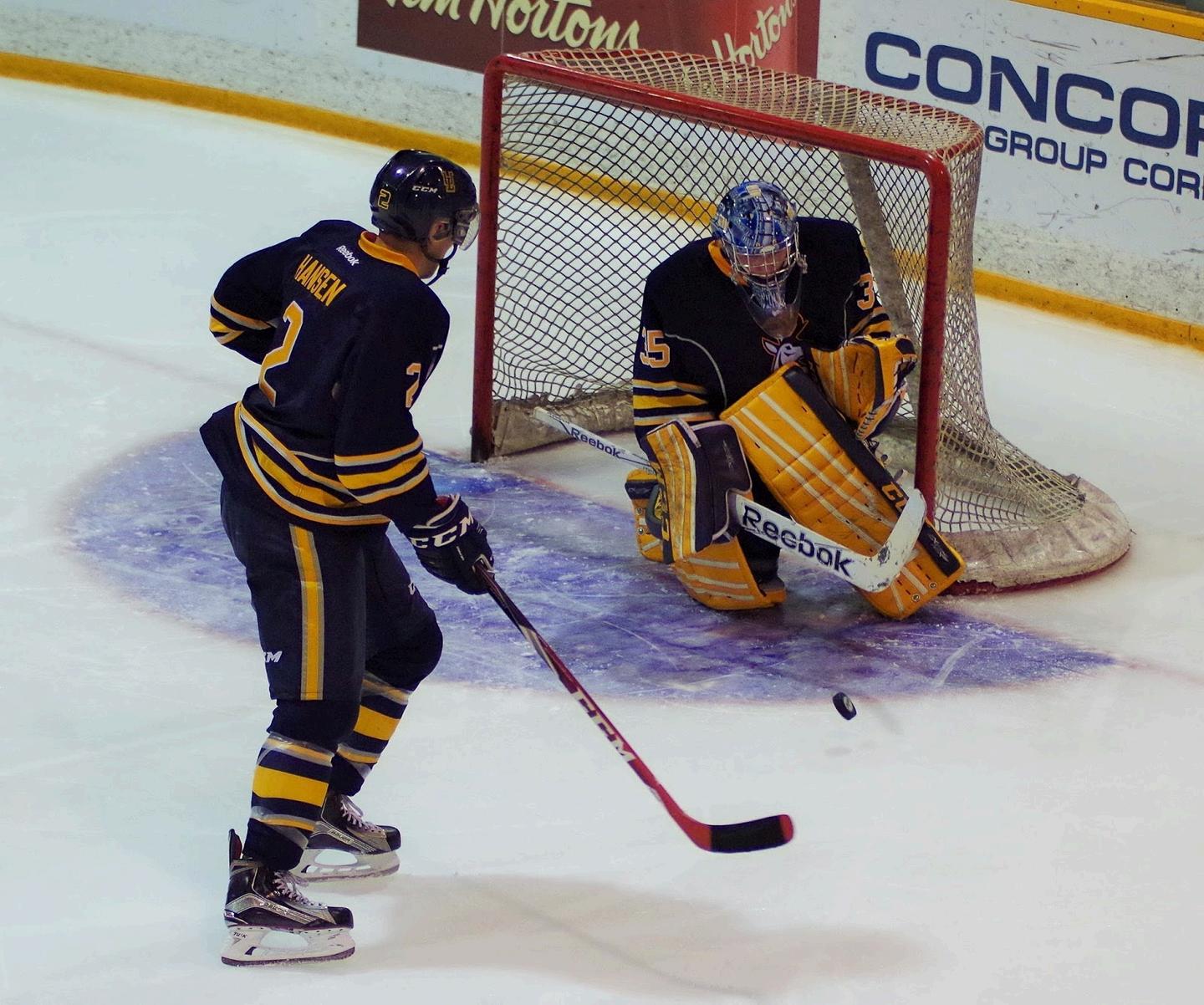
humans, move our bodies, and have fun. Some cool things can happen in our brains and bodies when we do those things ☺ Thus, it was not overly surprising to me when recent reflection revealed that many of my most treasured and meaningful experiences have been intimately shared with other humans in the context of sport So, thanks to all that have been there with, for, and against (respect your opponents, we can’t compete without them :P) me over the years, and sorry for any lingering anxieties experienced resultant of shenanigans personally perpetrated (that was a fun sentence to write ☺). I’ll risk much for the sake of fun, joy, competition, and curiosity (often at the same time), so a special shoutout again to those that shared in and supported me through some of those wilder times, I couldn’t have done it without you. Live long and prosper ��. Also, “crikey” ��.
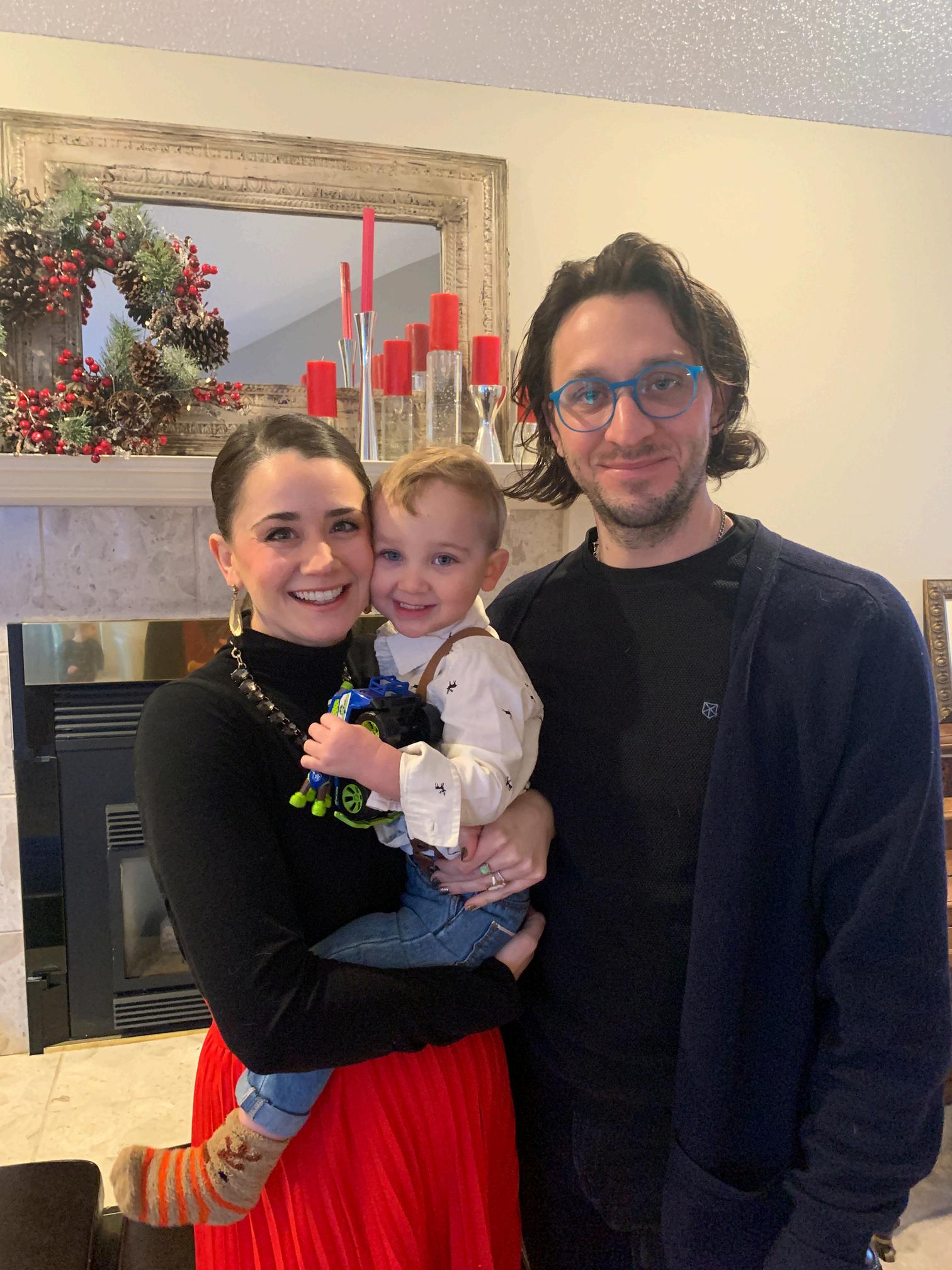
By Mike Mikado
I have been involved in sports for as long as I can remember. I'm pretty sure that my parents kept me busy with sports to keep me out of their hair. I played hockey, baseball, golf and badminton growing up and I was never the best player. Baseball and hockey were my consistent sports through school. In sports, just like in professional life, you do not have to be the best player to do well. If you can work well as a team, the many parts working as one can produce a strong productive outcome greater than the sum total of the individual efforts. That is one of the great benefits of team sports. This aspect is directly relatable to leadership, professional and business life.
My dad was always involved in the sports I played, either as a coach or faithful spectator. Once my daughters grew up to the stage where they could play sports, I became engaged in their sporting activities, as my dad did with me. I was hoping they would play hockey, but figure skating was their preferred activity. That's what got me involved in the Lethbridge Skating Club and serving on the board. I was the only man, serving on a board with 13 other women helping to brokerage deals with a variety of figure skating mom ' s with competing interests for budgetary allocation and ice time. If you think that sounds like an interesting experience and want to know what that's like, you should try running across an alligator pool with raw chicken hanging from your belt loops.

As I've grown older, I've needed the sports I engage in to keep consistent with my age; which is why I play hockey with the Lethbridge Oldtimer's Sports Association and golf at the Country Club. Remaining active in the later years has not only benefited my health, but I have been able to forge meaningful friendships too. In the same way when I was young, I'm not the best player, but when we work together as a cohesive team, we can be productive, have a good time and give a good showing. I believe being involved in and participating in a sport provides one with the skills to work together as a team to accomplish a shared goal.
My service on the Lethbridge Skating Club board was not the only board I served on. I serve as the current president of the Lethbridge Oldtimer's Sports Association, served as a member on the board of the Lethbridge Country Club and served as a member on the board of the Lethbridge Hurricanes Hockey Club. My wife thinks I serve on all these committees and boards because of FOMO (fear of missing out). I have found that serving on different boards has helped me learn to work with a lot of different personalities with common goals.
Serving on boards allows one to contribute to better the organization you are interested in and align the organization with its stated vision and make access to the organization equitable for everyone.
Playing sports and board involvement gives you great experience in working with a team and leadership roles. You don't have to be the best player to be successful. If you can work together as a team member; even as a leading team member to envision your teammates, you can help your organization or business be successful. It is worthwhile to enrol your children in sport. It is worthwhile to engage yourself in the boards that make the sports possible.


From Sport to Leadership Series 1 is a 4-part series of stories featuring local women leaders sharing their experience with sport, and how the skills learned through sport and active recreation impact their professional roles and life.
Thank you to Kara Hagen, Keegan Brantner, Paula Burns and Maria Fitzpatrick for sharing their stories with us.

by Kara Hagen
Sports have been a huge part of my life since I was able to walk. I would try keeping up with my older brother and do whatever he was doing to keep active, cycling, snowmobiling, seasonal sports, or even dirt biking. Growing up, I was very fortunate to have parents who supported me in every sport I chose (and I mean EVERY sport). With the support of my parents shelling out for new shoes, hotels, meals, uniforms, etc., I participated in all the sports the school offered, but also league sports within my community. Only now as a parent, with my kids involved in sports, do I truly appreciate the efforts they made and their sacrifices to make sure I could participate and how their cheers in the stands were what I performed for!
Participating in multiple team sports, as well as individual sport has played a large role in shaping me into the person I am today. Time management skills, resiliency, the drive to always push harder, and the ability to fight mental and physical fatigue came from participating in sports. The balancing act of managing morning practices, lunchtime skills building, after school games, and weekend tournaments, all while balancing part-time jobs and still maintaining honour roll marks, helped form healthy behaviors and respectable life skills. Even at a young age, I knew I had a responsibility to more than just myself; I had coaches and teammates relying on me. The skills I learned while having fun with my friends meant little to me at the time, but when I look back I am grateful for the opportunities I was presented and the experiences gained.
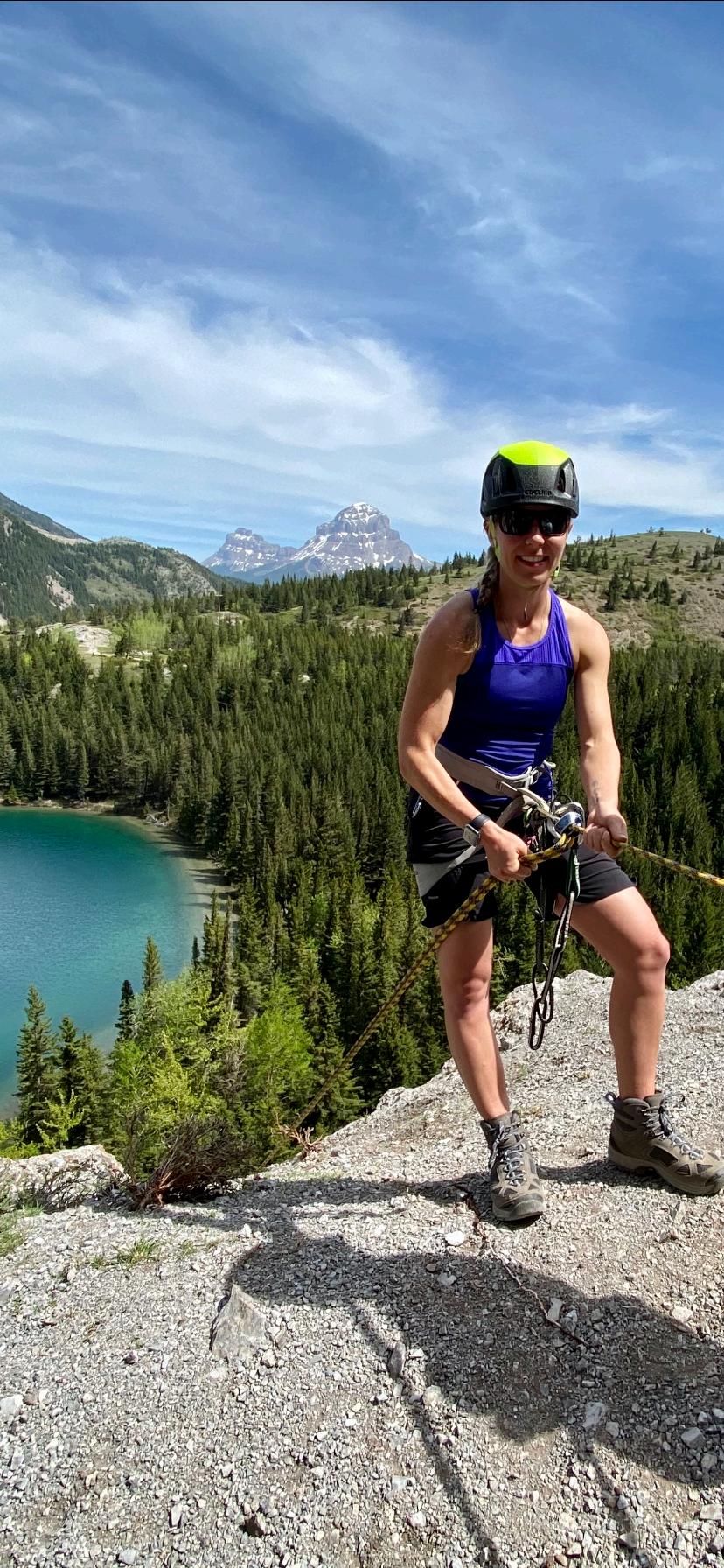
I have always thrived in team environments and have always been blessed to be able to jump into new communities and be surrounded by likeminded people, often based on common sport/athletic interests. Now that I have "aged out" of the competitive sports I once loved, I have graduated to more mature sports like softball, hiking, mountain biking, snowboarding, fishing, and anything else the Rocky Mountains can throw my way. By participating in sport from a young age, it made sport my lifestyle, not just a hobby. Throughout my grade school years and into adulthood, I never looked at my gender as anything other than how I was born. Being a female has never caused me to miss out on sports or limit me from achieving my best; in fact, I never had considered being less of an athlete because I was female and hope to raise my daughter the same way. I have always and will continue to jump onto different sports teams, not because they need another “female player,” but because they need another player. I have always expected my coaches, teammates, and now coworkers to look at me as more than a “female on the team,” just as I look to them for all of their strengths and skills they bring along with their experience and ingenuity.
It was no surprise to anyone that knows me that I chose a career in policing, as it is team-oriented, deals with high-stress situations, and relies on teammate working together to be successful. The shared winning mindset has always been vital to the ever-changing policing environment, especially in today's world.
I have learned that leadership is demonstrated in many different ways. Being a leader is different for each person and is situational. Silent leaders on sports teams were noticeable alongside the captains who were vocal and encouraging. This taught me at a young age that just because someone is wearing the “C" on their jersey (or the Sergeant stripes on a police uniform) does not mean they are the best for every task the team faces; how leaders recognize this, helps define their leadership abilities. A good leader wants to be challenged by their subordinates and is not threatened that someone may possess a skill set they themselves do not have. Being challenged creates change and new opportunities. Recognizing the potential and the abilities of teammates/subordinates, and fostering them to become better is a trademark of a strong leader. I’m reminded of a story told by my dad: The Foreman of their power line crew was suiting up to do one of the dirtiest, wettest, and least desirable jobs; he was asked why he was suiting up for the task and not making a young guy do it. The Foreman replied, “how can I expect others to do the worst job every time if I don’t ever take a turn?” That is a natural leader and a positive example of great leadership that has always stuck with me.
With a decade of policing under my belt, I have been privileged to experience both what I perceive as strong and weak leaders. I have accepted and cherish that working for a variety of leadership styles is important in the growth of one's own personal leadership abilities. Furthermore, I have learned that even though it is sometimes difficult working for what I perceived as weaker leaders, the growth, ideas, and resilience that forms within that team is like no other. Leaders must always put their subordinate's best interests first and think about themselves last. Remember that being a leader does not simply mean you have to have the title, with leadership comes greater responsibility, not greater power. Leaders are the people that others seek out, and most often this not due to a rank or because of a designated “leader” position, but simply by the ability seen by your teammates.
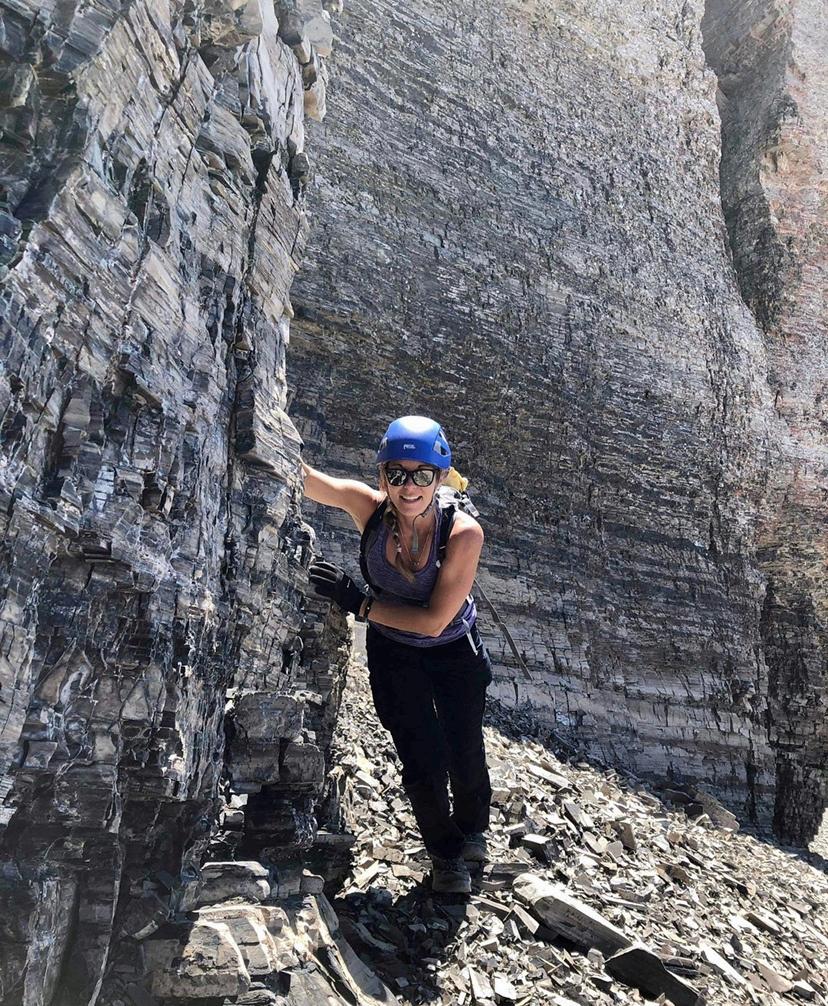
I frequently joke that being involved in sports has kept me out of trouble, but truly it has done so much more. The confidence-building, sportsmanship, commitment, and of course the leadership and teamwork life skills gained from organized and individual sport are amazing traits to learn and become a part of your identity, all while having fun and being healthy and active. Some of the best leaders do not even consider themselves leaders at all.
A series featuring local women leaders sharing their experience with sport, and how the skills learned through sport and active recreation impact their professional roles and life.
by Paula Burns
As a child, I was a sports enthusiast. Growing up in small-town Nova Scotia, sports weren’t about competition, but were just something we did. It was our social time. It was our pastime. It was our chance to connect with the other children from our neighbourhood and beyond.
I just loved the chance to get out and play, especially if it was outdoors. I played second base and catcher for a boys’ baseball team since our town didn’t have a girls’ team. In high school, I was part of a team that doubled as both a field hockey and soccer team, depending on which sport our opponents
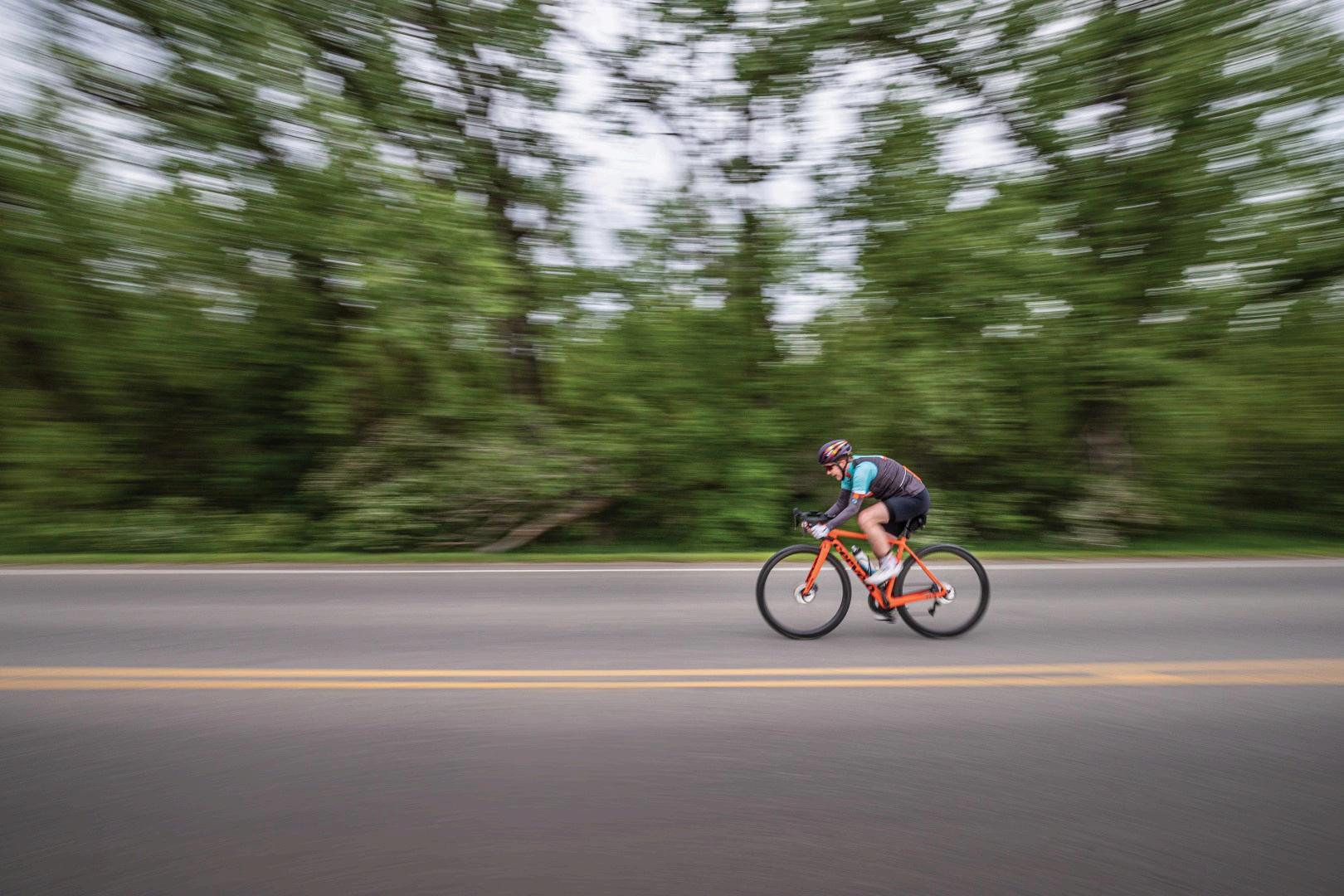
The one sport where competition did matter to me was curling I started curling when I was 12 and knew I had found my niche. I curled competitively in both the junior and high school ranks in Nova Scotia, and continued into my college years with the Fanshawe College Falcons in London, Ont. I played third on the mixed team – where we won an Ontario conference championship and earned a national bronze medal.
Looking back on it now, I realize many of the seeds of the future leadership roles I would pursue were planted during those long hours on the rink. When I would skip, I had to think in a strategic leadership mindset, looking beyond the current shot to the shots that will need to be made later in the end. Curling even provided me with an opportunity to make the toughest decision a leader has to make, as the first time I fired someone was a member of our team. That also taught me a valuable lesson in needing the right mix of people, skills, and personalities to make a team (or organization) run at its highest level.
As I have shifted careers, and moved provinces, it has always been important to me to stay active. I kept curling as long as I could until my job responsibilities made it impossible to commit to the same night every week (although, the COVID-19 pandemic has allowed me to return to curling for the first time in more than a decade!) When I moved to Edmonton in 2008, I decided it was time for a new outlet, so I began running. My love of the outdoors pushed me to keep going even through the bitter winters. I kept going until I felt comfortable entering my first 10 kilometre race, and later, my first half marathon
I eventually entered a triathlon that changed my life After fighting through the opening swim, I jumped on my bike and began passing people, which felt pretty great From that day on, cycling replaced running as my go-to physical outlet and has become a passion of mine No matter how busy my life is, I will always find time to hop on my bike I enjoy both road cycling, and mountain biking and I have had the opportunity to enter races on both the east coast and west coast I find satisfaction in pushing myself to achieve new personal goals
Because, here’s the thing: I have never viewed cycling as a competitive endeavour It is a chance to clear my mind, work on my fitness and balance my mental health Cycling hasn’t made me a better cyclist – it’s made me a better leader
On a mountain bike, you need to focus your mind on the task at hand or you can literally be risking your life On a road bike, there are times where you can just cruise and let your mind wander Both of these are important outlets to balancing the stresses of life and giving yourself a different perspective
Mental health is often referred to as a black-or-white issue, but it’s far from it Mental health is a continuum and every day presents new challenges and triumphs that can move you on that continuum Sport has always been my opportunity to balance myself on that scale When I feel strong physically, I feel stronger mentally and that manifests itself in all areas of my life I am a better leader for Lethbridge College when I achieve that balance I am a better mom, partner, and friend when I feel well physically and mentally It really affects everything I do
My experiences have shown me first-hand how important sports are to life, and I am fortunate to be in a role now where I can support others in their endeavours At Lethbridge College, cheering on our Kodiaks is one of my favourite parts of my job Our Kodiaks student-athletes continually emerge as student leaders They learn discipline both on and off the field of play, and they learn important life and time management skills that will stay with them long past their years at the college
And, the Kodiaks bring a vibrant culture to our campus community, which is so important Our community supports the Kodiaks and it makes our students and employees alike want to be a part of that culture I look forward to seeing how sports will help shape the lives of these young future leaders I encourage everyone to try something new and carve out time to follow your passions I know I wouldn’t be where I am today if I hadn’t learned all those lessons along the way
A series featuring local women leaders sharing their experience with sport, and how the skills learned through sport and active recreation impact their professional roles and life.
by Keegan Brantner
Sport and being a participant within sport has always been a large and influential part of my life and shaped how I identify myself. From childhood, sport was always part of my life. I began as a spectator watching my older brother Peyton play hockey. Soon after, it was my turn to finally participate in sport myself. I showed great interest in hockey and I wanted to play just like my brother. My parents, always supportive and encouraging saw this enthusiasm and desire to play hockey. They saw no issues with my desire to play hockey as a girl. Although others made comments to them and even to me as a young child. As a four-year-old I was questioned about my unconventional desire to play hockey and others even attempted to persuade my choice through statements like “don’t you want the pretty white skates?”. These unsought comments and perspectives continued throughout my time participating in hockey. This didn’t influence me as to me I was playing hockey and was unconcerned by the gender stereotypes. I was a girl on a boy dominated team but I was no lesser of a player due to my gender. Looking back at my experience I am adamant many of teammates felt the same about my skills and having me as a teammate. I fit in and I became “one of the boys”. I was often the captain of these teams and felt respected by most players.
My early years in hockey were the developmental years that shaped my success in future sports and concurrently my leadership skills. A consistent coaching staff that held my standard of play to the same as my male teammates challenged me to

never be complacent. I would never be treated any differently and I was expected to compete the same as they were. Ryan Rombough, a passionate and knowledgeable hockey coach always believed in me and knew how to push me to work harder. Rich Nagai, a kind spirited and joyful coach awarded me praise for my work ethic but challenged my skill development. And lastly, the toughest, most critical and most influential coach, my dad. My dad alongside my mom believed I could do anything I set my mind to with determination, hard work, and a good attitude. My dad always held me to the highest of standards, pushed my comfort zones, challenged my work ethic, expected my best performances all while being the most encouraging and proudest dad. These three coaches, extremely influential all instilled in me that I could and I was just as good of a hockey player as the boys.
Throughout my youth and adolescence, my stature and build often resulted in me being referred to as “naturally athletic”, although my genetics did not always result in me being the best or most talented player on a team. I was cut from teams, I was a benchwarmer, I was an injured player and I have not dressed for games. Those moments were hard but they were valuable. As an adult I can now reflect on these times in my athletic career to be the most influential in shaping me and my values as a leader, teammate and athlete. Like most, these influential times were not of great success and triumph but times where I faced adversity, challenges and a lot of self-reflection.
I love hockey and I loved playing hockey; to date I have spent the most time of my life playing hockey. This all came to an end when I was in grade 12 when my current team, the SEAC Tigers, folded. This was extremely upsetting but at this point I was playing high level rugby and that was my focus. The rugby season didn’t start until the spring and at the time there was limited options for winter training. As fate would have it the high school basketball coach was at the rugby year end BBQ and heard that I was not playing hockey the following year. He jokingly encouraged me to play. And so I decided I was going to try out for our high school’s senior varsity basketball team. This was honestly quite unrealistic, our school had a great basketball team placing second in provincials the year before with most of the team returning. I had not played basketball since grade 8 so to say my basketball skills and knowledge were poor would be an understatement. I went to a basketball camp at the University of Lethbridge to prepare for tryouts and I was flat out terrible. My dad came with me to every session which was comforting but still to this day my dad says it was one of the funniest things he has ever seen because I was SO bad. Every session I would try to convince my dad to let us to be late and for those who know me well know I hate being late but I wanted to miss the first 15 minutes of dribbling drills so badly I didn’t care. My dad never let me be late. Just because I wasn’t good at dribbling and I was embarrassed was not a good reason. I was the one who chose to play basketball and I had to be committed.
Thankfully the basketball coaches Kenney Wood, Brandon Bullock and Marty Johnson saw something in me at tryouts that they felt the team needed which was definitely not my basketball skills. They saw my determination, work ethic, and light hearted personality; these were aspects that I could bring to help the team in different ways than being a skilled player on the court. I showed up every day to practice ready to work hard, learn, have fun and laugh; I loved practice and I always told my dad “you should come watch me at practice I’m honestly not that bad”. Being the absolute worst player on the team was not always the easiest but my teammates were incredibly supportive and always celebrated my successes. I will never forget our first home game of the season, the stands are packed and I get put in the game. Boy was I nervous. And then I made my first basket. This resulted in the ENTIRE crowd and my teammates cheering and standing up. I was embarrassed but I was happy to feel the support.
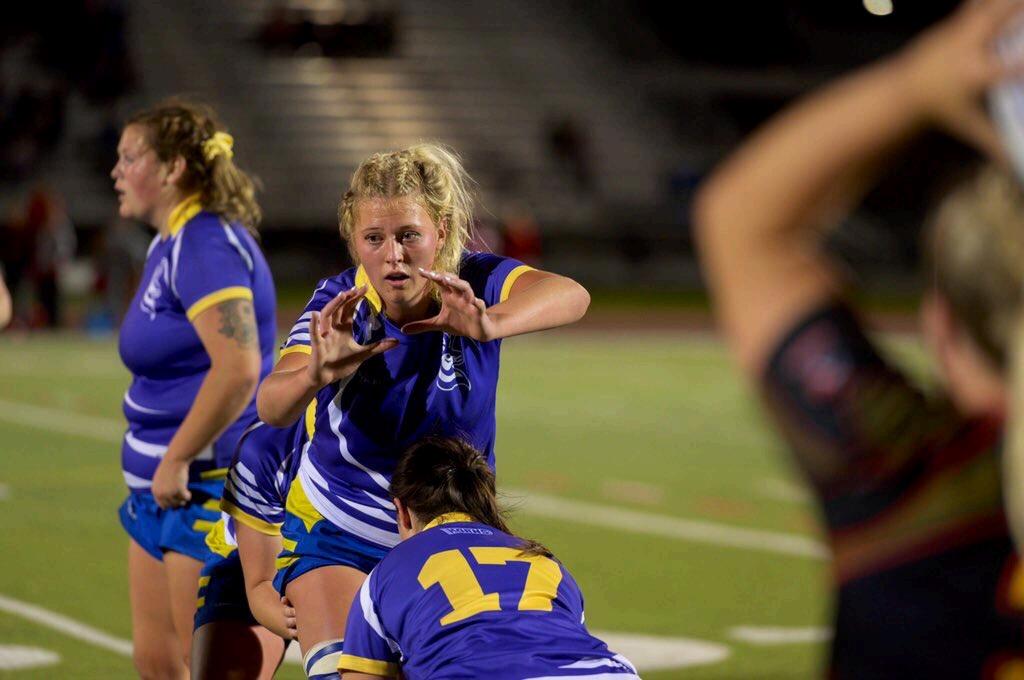
I was fortunate to be part of such a special team but the time to relish in our victory was short as the end of the basketball season meant it was time for rugby. I cherish and loved my time playing hockey and basketball but rugby was my passion and where I was able to be most successful. The start of my rugby career was not filled with excitement but fear. I was in grade 9 and I was extremely nervous and scared, I did not want to play. Lucky for me my support system, my kind hearted and loving mom pushed me out of the car at my first practice; if my mom had let me succumb to my fears I may not be writing this story now. Rugby was everything I had ever loved in hockey and more. It became my thing. I decided to go to a Rugby Alberta tryout in grade 11 and I sat in the car with my mom nervous and scared just as I did before my first practice. My mom has always been full of comforting and wise words. She taught me a lesson that I have carried forward with me through sport; if I am scared and nervous so is everyone else, make people feel welcome and comfortable.
Every step of the selection process I was shocked and surprised to find out I had made it. Going into tryouts I didn’t know what to expect, I didn’t know how I would compare and with over 100 girls trying out I didn’t think I had a chance. I was a nobody from Taber. But I made it and my fearful mindset changed. Why not try? The potential of success from there on would outweigh my fear of failure. I later found out I had been identified at a tournament with my high school team by the head coach, Randi Hamre. Randi will forever be the most influential person for my rugby career. Randi is a strong and confident woman, and a respected coach in a male dominant field, she quickly became someone I looked up to. Randi always believed in me, she saw my potential and even helped guide my choice for what university I would attend.
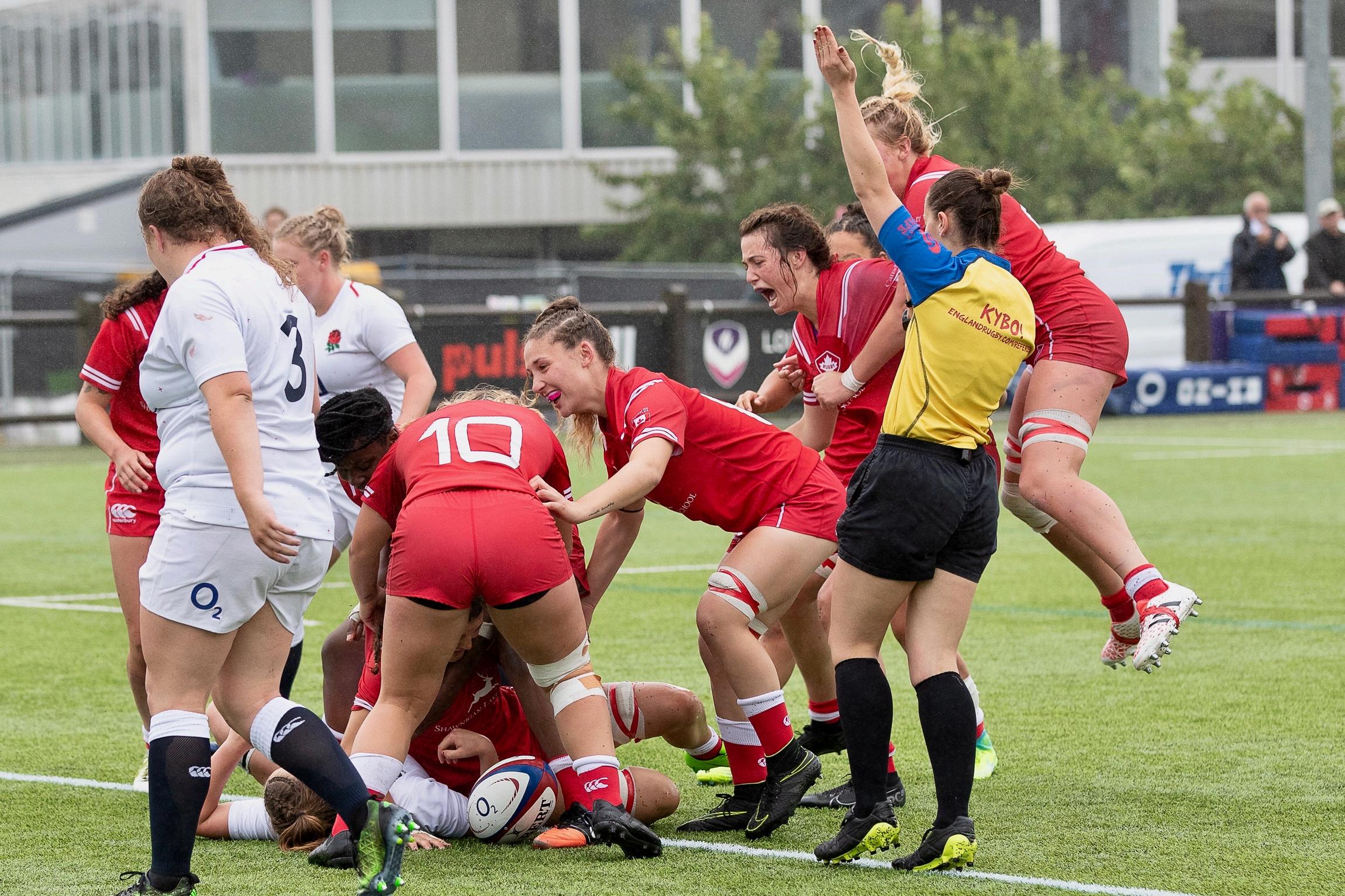
I am so thankful for all the coaches I have had from initiation hockey to team Canada rugby. Each coach has had a lasting impact on my skills, my leadership and who I am. They have all unknowingly taught me valuable life lessons that I have carried with me as a student, athlete, leader, person and future coach.
I can attribute my leadership development to the opportunities and lessons I have learned through sport but largely through the love and support from my parents. My journey is not over though as I have an amazing opportunity to play my final two years as a Pronghorn at the University of Lethbridge with a talented and supportive coaching staff. During these two years I will be pursuing my masters with Dr. Scott Rathwell focusing on athlete leadership. As I continue my education I hope I can help pave the way and be a voice for other little girls who don’t want the white skates to follow and pursue their athletic dreams.
A series featuring local women leaders sharing their experience with sport, and how the skills learned through sport and active recreation impact their professional roles and life.
by Maria Fitzpatrick
Very early in my life I became aware of self. As I ran through the hayfield next to my grandparent’s farmhouse, feeling the air through my hair and the sun on my face I was aware of me as a person, as separate from others. I was probably 4 or 5. It felt so good to me that I believe I subconsciously wanted to hold onto that positive feeling, that emotion. I suspect that was my first experience with my own adrenaline and the 'rush' it provided.
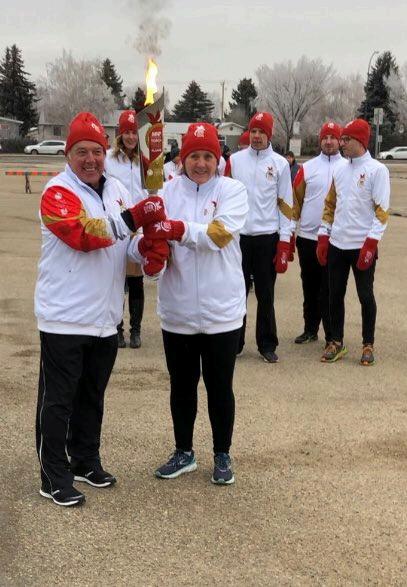
I was one of six children. The first four were all girls with me as the second oldest. Whether at home or in school or on holidays I was always on the move. I often tried to organize my siblings, and my cousins when they were visiting, to play games - preferable active games. They weren't always cooperative. As I got older I wanted to do the same thing with my friends.
Our mom didn't encourage me with sports because she said little girls don't do that. However, she insisted that I take piano, viola, and singing lessons. I played the viola in the orchestra and sang in the school glee club.
Dad loved baseball! I went to ball games with him. He explained the game to me, the rules, where to hit the ball, how to hit it to get a specific result. He taught me to catch and throw and to hit the ball. There were lots of kids in the neighborhood and most of the boys played baseball or stickball. They allowed me to play with them but only when there weren't enough boys to put two teams together to play. I resented being iced out. I continued to play catch with my dad and improve my skills. I would toss a stone in the air and hit it with a stick to practice my hitting. Eventually, the boys began playing in league ball and there was no place for me. I was angry, frustrated about that because there should have been a place for all to participate. I complained, (mostly to my dad) about feeling excluded because I was a girl. I guess I was especially upset because I wasn't valued for the skills I possessed as an athlete rather, I was excluded because of my gender. Dad continued to play catch with me. This was an early lesson for me about inequality and it fueled the fire within me to fight against it and to fight to achieve equality. That fight continues.
When we expressed dissatisfaction with something, dad often said if it is really important to you then you should do something to change that with which you are dissatisfied.
When I began high school (grade 9) I tried out for the basketball team and didn't make it. I was so disappointed but I kept practicing. I tried out again in grade 10 and did make the junior team. I practiced hard, I played hard and I got better. The next year I was on the senior team. I loved playing basketball but did struggle with strategy, mainly because I disagreed with the coach's approach. As I look back it was a time for me to learn some lessons about focus and strategy.
Close to the end of high school, there was a call-out for anyone who was interested in competing in the city's school track meet. I loved to run - I was there in a heartbeat. I didn't get to run in that track meet as the only space on the team was for the high jump. I wanted to be on the team so I did the high jump. The physical education teacher showed me how to do the scissors jump, the style of jumping used at the time. At the competition I learned another valuable lesson when I came in second. The girl who won jumped the same height as I. The rules were that if there was a tie at a particular height the one who had taken less tries throughout the competition would be awarded the win. She had one less try than I did. I jumped at every height, she did not. A tough lesson to learn. This experience wet my appetite for track, competition and knowing the rules. I was beginning to realize how important it was to focus on what I was doing and how I was doing it. If I wanted to win and I did want to win then I also had to hone my focusing skills.
I sought out the local track club and joined because I wanted to run We went to the track every evening for a couple of weeks to practice before the provincial track and field competition was to be held I entered as many events as I could fit into the meet schedule I won the high jump, I came second in the 100, first in the 200, second in the long jump and I don't remember about the other events I felt like I was in heaven All day I was thinking after each event what I needed to do to improve, run faster and jump higher I barely lost the 100 because the winner had gotten a faster start than I did I had sore quads but instinctively knew that I needed to keep moving and learn more about every facet of the event I definitely needed a better start I was becoming focused
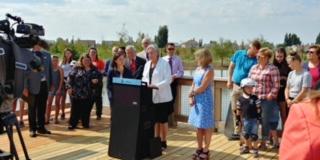
I was invited to be part of a provincial team that was going to the Highland games in Moncton, NB. That winter I joined the Newfoundland Track and Field Association and volunteered to help on the executive. I learned that in 1969 the first Canada Summer Games would be held in Nova Scotia and there would be a Newfoundland provincial team. I wanted to be on that team. In my mind I could see myself on the team, I could see myself running the race. I began to hone in on what I needed to do to reach that goal.
One of the Phys Ed professors from Memorial, Yvette Walton attended that meeting. I didn't know it then but she had attended one of the track meets and had seen me run and wanted to coach me. She volunteered to help out with the coaching of those who were interested in participating in Track and earning a spot on that provincial team. Training began that winter, we ran indoors in a double gym at the airport. Someone volunteered to build banked corners - primitive they were, but they certainly helped.
Series 1 - 2021
Series 1 - 2021
This was certainly a test of my own focus. It was pretty straight forward for me to push the rest of the team to do their workouts and improve, it was much more difficult to push myself. With my eyes on the goal I focused, I lived and breathed running. I did push myself.
A series featuring local women leaders sharing their experience with sport, and how the skills learned through sport and active recreation impact their professional roles and life.
A number of times during that year of training I was told by many not to have too high expectations as it was an open competition. This meant that all of the women from the Canadian Mexico Olympic team would be competing. Yvette never said that to me she just encouraged me, helped me to focus and provided a training experience that was a set-up for success Instead of being intimidated by the negative comments of others, I bought an autograph book to get Irene Piotrowski's (Canadian sprint record-holder) autograph. I knew I needed to focus on my own races and do the best I could - run my best times I did! I set my personal bests in the heats, semis, and then finals for both the 100, 200, and 400-meter races I beat each of the four women from the Canadian 1968 Olympic team in either a heat or a semi. I was running the same times as the women from that Team.
My focus paid off! I was invited by the Canadian Track and Field Federation to participate in the Canadian Championships in Victoria, BC, the week following the Summer Games. Yvette and I flew from St. John's, NL to Victoria, BC on Friday and I competed on Saturday morning I matched my times from the previous week despite the 4 5 hour time change and 16 hours of traveling the day before
I continued with track, basketball, fastball, and occasionally other sports for socialization Focus had become ingrained at this point in my life It saw me through some very difficult times throughout my life and undoubtedly kept my daughters and myself alive.
Let's fast forward now to the late 80s - I was working for the Correctional Service of Canada (CSC) as a parole officer in Red Deer. Our contract had expired and we were in contract negotiations. Our employer constantly told us we were invaluable to the functioning and success of the service, yet in negotiations, we were not appreciated None of us were designated and we went on strike for 3 and 1/2 weeks I was on the line every day, spoke to my fellow strikers helping to keep up morale our District Director did visit the line despite our line being in Bowden and he was in Edmonton Our union component leader also came to the line and met with us Afterward she spoke to me and asked if I might be interested in taking a position on our local executive (Focus on the goal was what kept me there for the 3 and 1and a half weeks) After the strike was over the District Director spoke to me as he renewed my contract following the strike and said by going out with all of my colleagues I showed him how much I was part of the team and in this job we needed to be a team
A move to Edmonton in 1995 to the Edmonton Parole Office once again drew on my inner resources and focus I became the local president during some very trying times In 2001 this was coming to a head as we were once again in contract negotiations. We were doing intermittent striking across the country when 911 hit us. This strike ended immediately and it ended with a more positive result to our contract I still applaud all of our administrative staff for the incredible strike lines they held!
In 2012 I was closing in on my retirement, I requested a pre-retirement transition back to Alberta so that I could be close to my family When I arrived back in Alberta, I began to see politically that the same things I witnessed in Ottawa in terms of regressive governing was happening in Alberta. I was so frustrated as this did not support the people of the province I joined my local NDP constituency association Lethbridge East and the federal association I knew that complaining would not change things and I thought about what I could do to effect the positive change I was seeking.
Mark Sandilands, president of the Lethbridge federal association noticed my interest and action on local issues, one of which was fracking inside our city limits. He asked me if I would consider running for the Federal Riding for the NDP. I graciously declined because I had no intention of going back to Ottawa. I told him I was interested in politics but I felt I could do more good locally Mark and I talked about municipal and provincial politics and many of the things that needed to be done. I talked it over with my family as I needed their support. I then asked the previous NDP candidate in Lethbridge East if he would be running again. When he said he didn't know, I immediately made
A series featuring local women leaders sharing their experience with sport, and how the skills learned through sport and active recreation impact their professional roles and life.
the decision to run for nomination. A campaign needed to begin and it needed to begin right away. The federal campaign had begun and I was canvassing in the Lethbridge East area for our local NDP federal candidate, Cheryl Meheden. Rumors began to fly that an early provincial election may be called.
Our association executive met and organized a nomination meeting. I won the nomination and I focused on the campaign with our fantastic and truly committed team. I retired from the federal government effective Feb 14, 2015, and we began our intense campaign on Feb 15 right through Election Day May 5, 2015.
That successful campaign led to my being in the Alberta Legislature representing the constituents of Lethbridge East and representing all Albertans. When I was in the legislature and working in the community as an MLA, I realized how important it was to be laser-focused on each issue to do the work that had to be done. This allowed me to truly represent my constituents. Several times I have looked back at where that focus came from and I could easily trace it back to those days on the track running; a time when I did not hear anything but my heart beating and not see anything but 10 yards past the finish line - total focus on the goal.
The focus as a political leader was and still is, what is the end result for the constituent, and will it be positive. Will it make life better for Albertans. The question for me was, what do I need to do to make that happen?
This was and is what I want for my community and to achieve this is where I am focused. I believe that being involved in sport especially at the elite level is where I developed and honed my skills to focus on what needed to be done to achieve the target goal.
Every training session whether on the track or in the weight room had an objective. I had to build strength – to be faster out of the blocks. So If I had 3 sets of each exercise I had to work as hard on the last as I did on the first. When I practiced my starts I had to react instantaneously to the commands and the sound of the starting pistol. I had to focus to hear nothing but those. I had to build my endurance to improve my ability to run heats, semis, and finals possibly all in one day and to do each at the fastest speed I could run. I had to do that at every sprint practice and every run had to be the best/fastest I could run that day. When I practiced I heard nothing that was going on around me, I could feel my heart beating and my body moving but I didn’t even feel my feet on the track. I was 10 yards past the finish line.
Another question I had been asked was about nature vs nurture. I think nature played perhaps a bigger part in that I believe I had some natural talent, my body build was suited to be a sprinter. I could push my self and I could work hard.
But then was that a part of the nurture? Although my mom did not feel girls should be participating in sports she didn’t stop me and my dad encouraged me. She did attend my track meets, basketball, and fastball games and she volunteered to chaperone at a few of the out of town meets.
All of the things I did through which I learned to focus did put me on a path of leadership Even though I had never thought of putting myself forward in politics when the need arose I put myself out there in 2014 to get ready for the May 2015 Alberta election and I will do so again for the next election in 2023 I have already begun to focus on campaigning
I hope this part of my life story will encourage others to become involved with sports, learn to focus and become involved in making your community a better place to live for everyone
A series featuring local women leaders sharing their experience with sport, and how the skills learned through sport and active recreation impact their professional roles and life.